What’s it Like to Live in Cuenca Ecuador? 9 Reasons We Chose Cuenca
What’s it like to live in Cuenca Ecuador? That question could have many answers. The response could differ greatly depending on who you ask, where they are from, and what mood they are in at the time.
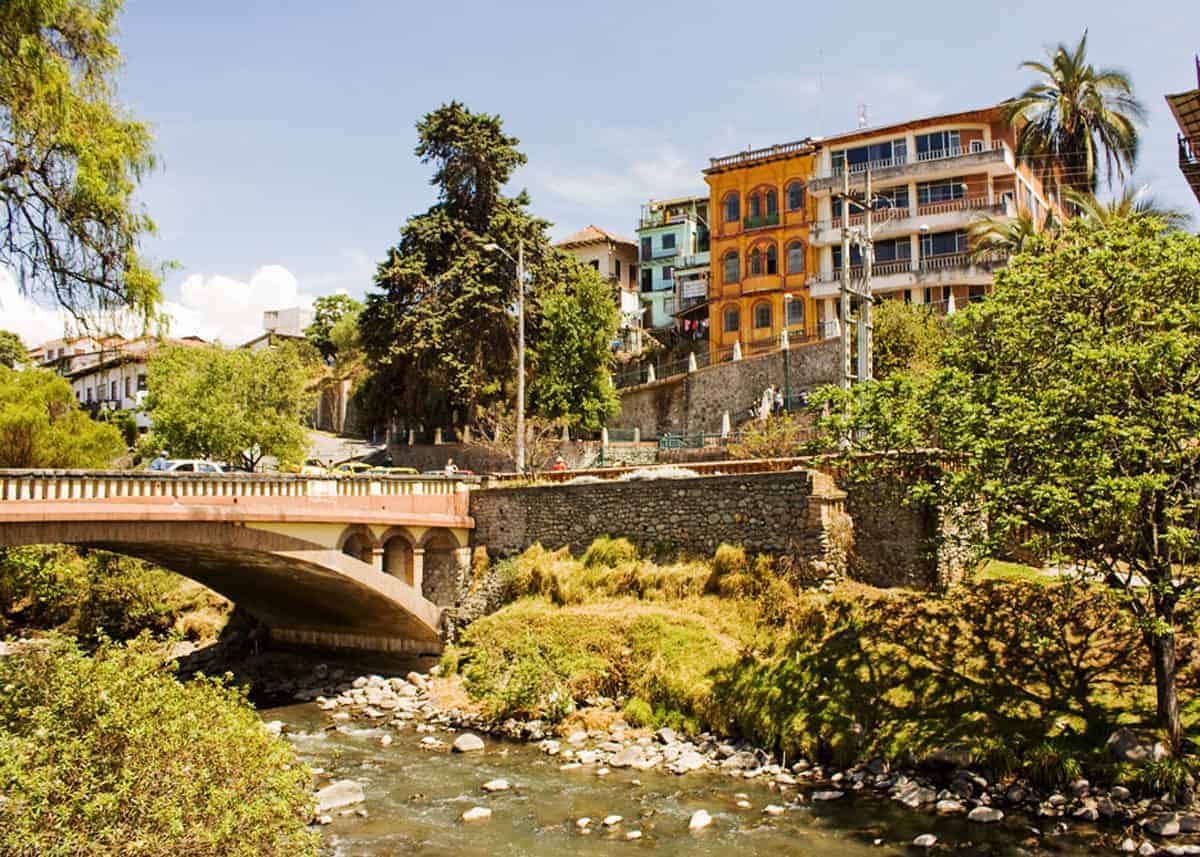
What’s it Like to Live in Cuenca Ecuador?
We all carry certain perceptions and habits that could influence the outcome of experiences we have in Cuenca, good or bad.
This could leave a person calling it a paradise or an unfriendly desert… depending. I think that holds true for just about anywhere.
Cuenca Ecuador: An Expats Paradise?
The many things we like about Cuenca (…culture, architecture, climate, language, mix of modern and old infrastructure) could be the same things that other people don’t like.
One thing to remember when doing research about relocating is that when you read blogs, you are reading personal opinions – and opinions can differ greatly.
Opinions are generally more about feelings and less about facts. It’s always best to get a big picture by reading many different sources and then checking things out for yourself.
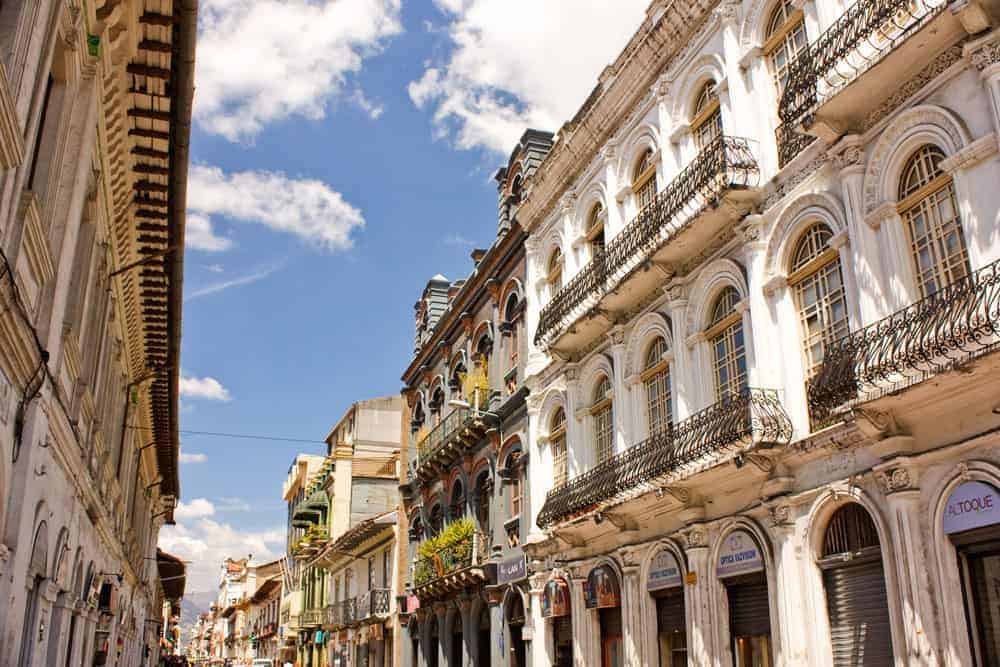
Whether or not Cuenca is a paradise for expats depends on the expat.
Here is a basic breakdown of our feelings about 5 different aspects of life in Cuenca.
Crime in Cuenca
There is crime in Cuenca like any other city. You may become a victim of a crime like we did, whether it’s a snatch-and-grab or something more scary.
For example, our family comes from small-town Canada and Cuenca is the first city we’ve lived in. Because of our small-town habits we made the wrong decision to have a lengthy conversation on the street in front of our apartment in Cuenca, at night. We were having a relaxed conversation with our neighbor. That bad decision left us an easy target for the two thieves that robbed us.
We had been told that Cuenca is not all that safe at night (like most cities) but we had been there for a few years with no problems so we were feeling a little too comfortable. This probably would not have happened to people used to city life.
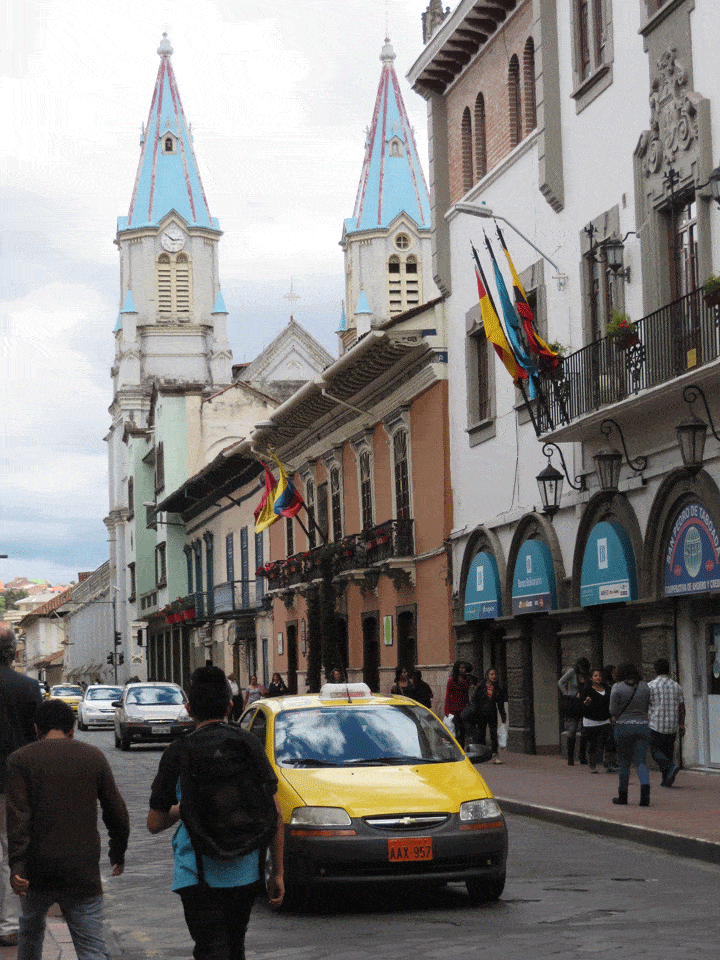
So should hearing that we were robbed make you write off Cuenca or Ecuador altogether?
Would hearing that someone was robbed in a small city in the United States make you avoid that city, that state, or perhaps the U.S.A altogether?
It may sound funny to compare things that way. And as a foreigner, you may feel more vulnerable because perhaps you don’t know the culture or language, but when it comes to crime it often has more to do with habits and decisions than the area itself. Crime is just about everywhere.
Cuenca is not a crime-free paradise. It does have a low crime rate compared to cities of a similar size in North America.
So by taking precautions, like not being in isolated places (especially at night), not wearing gold and expensive jewelry, and wearing your bag diagonally across and in front of your body, you will avoid much of the crime that does exist in Cuenca and pretty much everywhere else.
Cuenca’s “Spring Like” Climate
Cuenca has a nice climate. It does get cold – cold enough to make you shiver and see your breath in the air. It also gets hot, hot enough that you can feel the top of your head burning as you walk to the corner store.
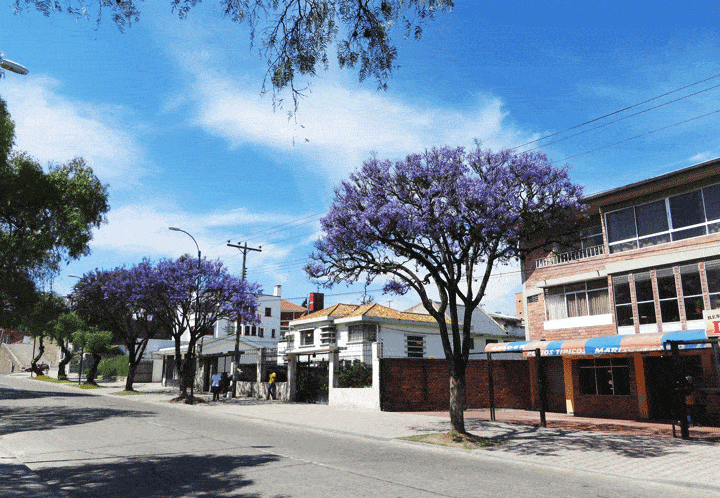
The climate in Cuenca can change a lot during the run of a day largely because of the altitude. Cuenca is high in the Andes mountains (8500 feet) so when the sun is hidden behind could cover it gets chilly, so you may see hail.
It also gets hot because of its high altitude and on the equator, so you’ll see palm trees, but you won’t see many outdoor pools.
Locals say that in Cuenca you get all the seasons in one day. You may be rubbing your hands together to warm them up while waiting for the bus/taxi in the morning and then arrive home in the afternoon carrying your sweater and jacket over your arm. An umbrella is a very useful tool for the rain and the sun.
In Cuenca, it can be cloudy and cool or sunny and warm for days on end.
Your feelings about the climate may depend on where you are from and your preferences. I really like the climate in Cuenca, I would rather be a little on the cool side than too hot.
Cost of Living in Cuenca Ecuador
Cuenca is known to be the most expensive city in Ecuador. With that being said, your expenses will probably be less than they are now if you are living in Canada or the U.S.A.
We’ve lived in a 5 bedroom 2 1/2 bath home for $280. We’ve also lived in a 3 bedroom 2 1/2 bath apartment in a security building with underground parking for $450 a month.
Even with the $450 rent, we were paying less for things like gasoline, electricity, water, groceries, health insurance, car insurance, car repair, and dentist bills.
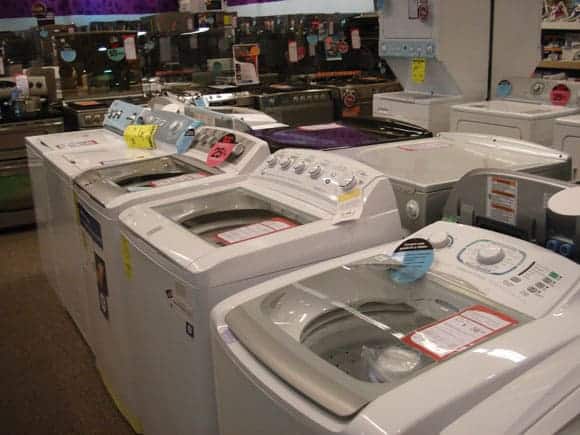
Sometimes people are shocked to find out that not everything is less expensive here. Some things even cost more, like electronics and brand name makeup (Cover Girl, Revlon…) other things cost the same, like imported food (Oreos, Cheerios…) and clothing.
Can you live in Cuenca if you are broke? Not really, but you can live on less money than in the States or Canada especially if you don’t buy the things that cost similar to or more than they do there.
Quality Of Life in Cuenca
From what I’ve heard about city life, Cuenca is pretty good.
There is good health care, with clean modern hospitals. There is even a cancer hospital (Solca) in Cuenca. There are a lot of specialists and medical care facilities, so it has never taken us much time to get an appointment. We pay around $20-30 for an appointment with a specialist.
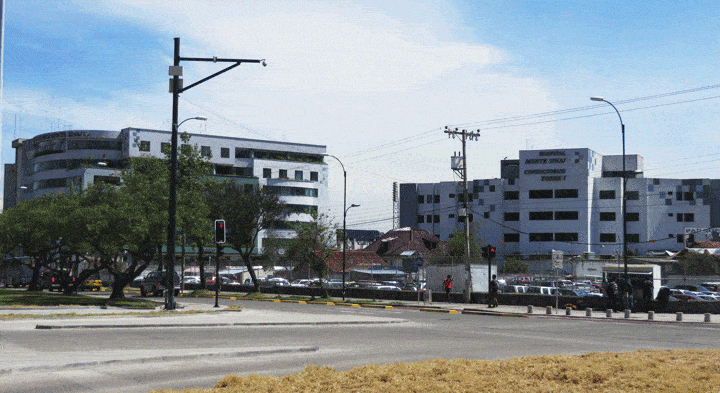
There are nice parks, restaurants, and cultural events to enjoy. It’s easy to have a healthy diet because there are lots of fresh fruit and vegetables available at the markets year-round.
Is Cuenca a paradise for people looking for a higher quality of life? Maybe yes, maybe no. It depends on what you are comparing it against. The air is not crystal clear everywhere in Cuenca.
Because it’s a city there are fumes from cars and buses especially on the busy streets, but unless there are fires in the mountains (hardly ever happens) there is no smog. Or at least I can say that in the 4 years we’ve been exploring Cuenca we have never seen smog.
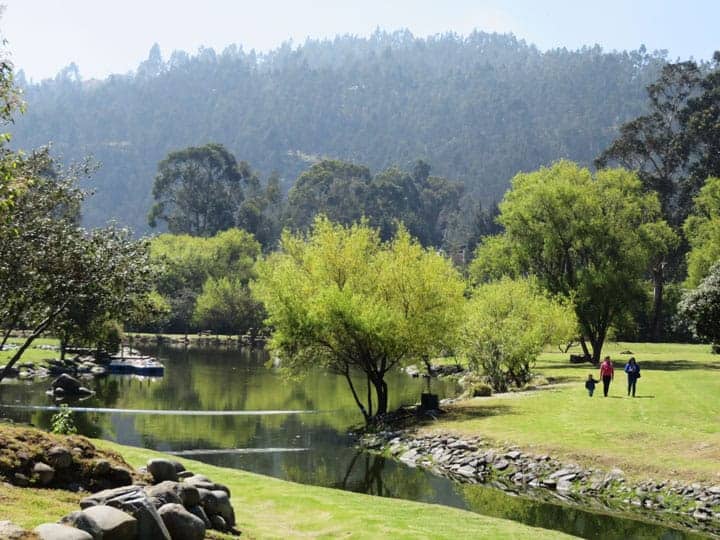
If you are planning a visit and traffic fumes really bother you it would be best to look for a hotel away from the center. It’s best not to buy an apartment unless you come and check out the area for yourself.
Big Picture Opinion of Cuenca Ecuador
Cuenca is a nice city with people that are friendly toward foreigners. If expats are friendly and polite, if they try to blend in and are careful not to be in isolated places at night – they should be able to enjoy the city and not have many problems.
Reasons Some Expats Decide Against Cuenca
People decide not to relocate to Cuenca for lots of reasons:
- it may not be as warm as they would like
- they may decide that they would rather be in a small town
- that a different culture would suit them better
- they may not be able to find everything they were used to having back home
- they can’t handle the isolation that comes with learning a foreign language
- they may have a health concern they were not expecting…
Here’s more about why some expats decide not to live in Ecuador.
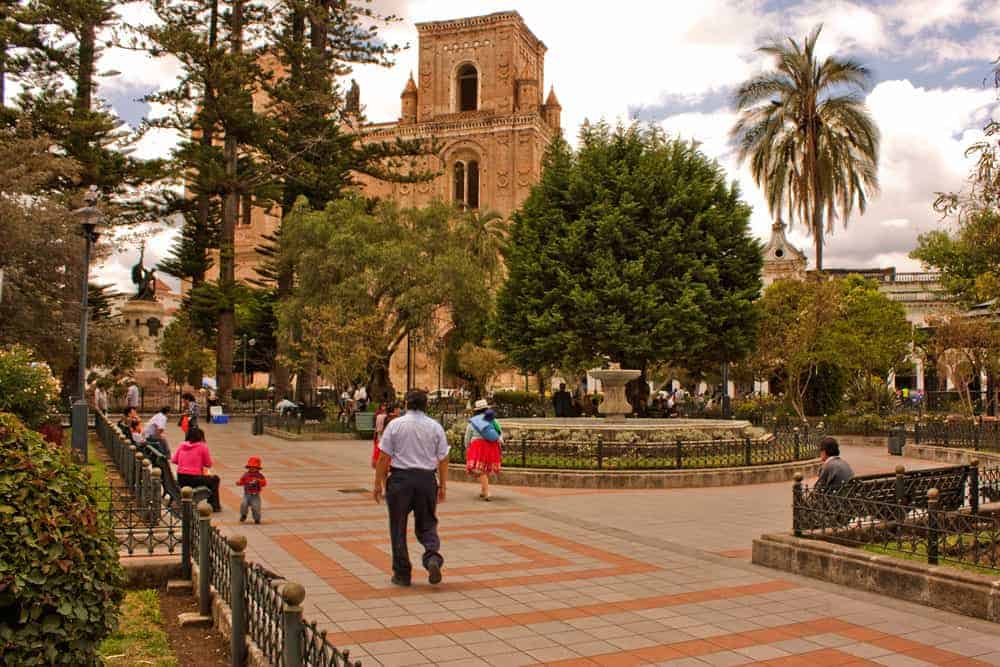
Usually, when we hear people with an awful opinion of Cuenca it has more to do with a bad experience because of a lack of respect on the foreigner’s part, either for the language or local customs.
Sometimes it’s because they were expecting Cuenca to meet an unrealistic list of “paradise-like” expectations. Or maybe they didn’t take proper crime precautions.
We were here for a number of years before being robbed. Because of that experience, I can understand why a person new to a foreign country could see everything about that country through scared and suspicious eyes if they were robbed the way we were.
It’s best to take precautions so a bad experience does not leave you with an unbalanced view of the area and ruin your experience.
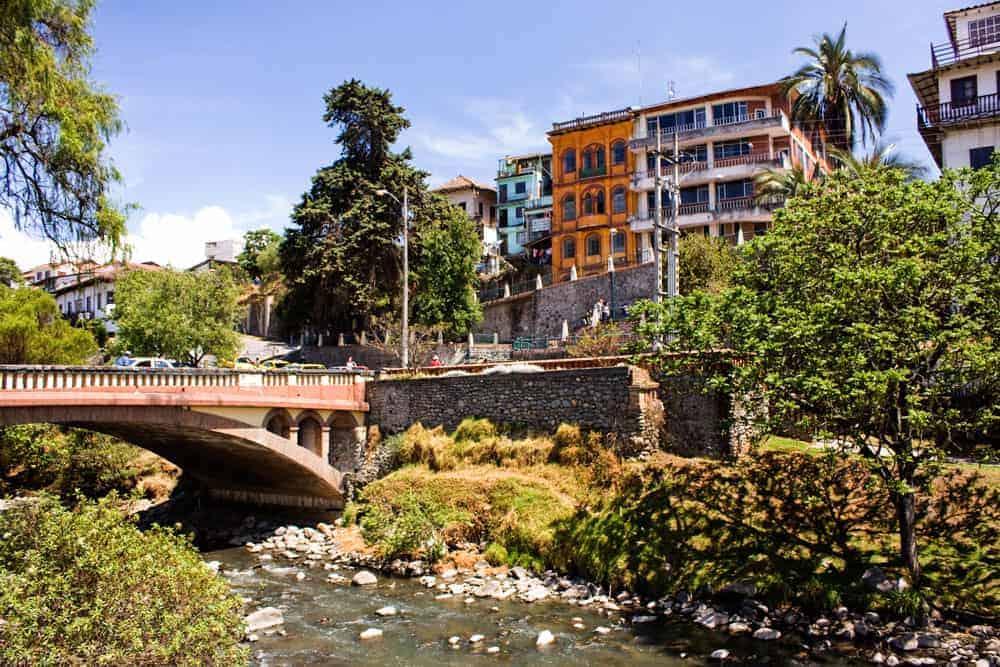
If you already speak Spanish things will go much smoother and you will feel at home sooner. We didn’t speak Spanish when we moved just over 4 years ago and that made things harder for us, but we’re glad we moved when we did.
It’s easier to deal with the shock of total immersion when you know in advance that it will make relocating rougher.
We like Cuenca and we know many others that do as well. The best thing to do is to come check it out for yourself and form your own opinions.
Please share your thoughts about Cuenca by commenting on this post.
9 Reasons We Chose to Move to Cuenca Ecuador
Thinking about a move abroad – but aren’t sure about where? Here’s why we chose to move to Cuenca, Ecuador.
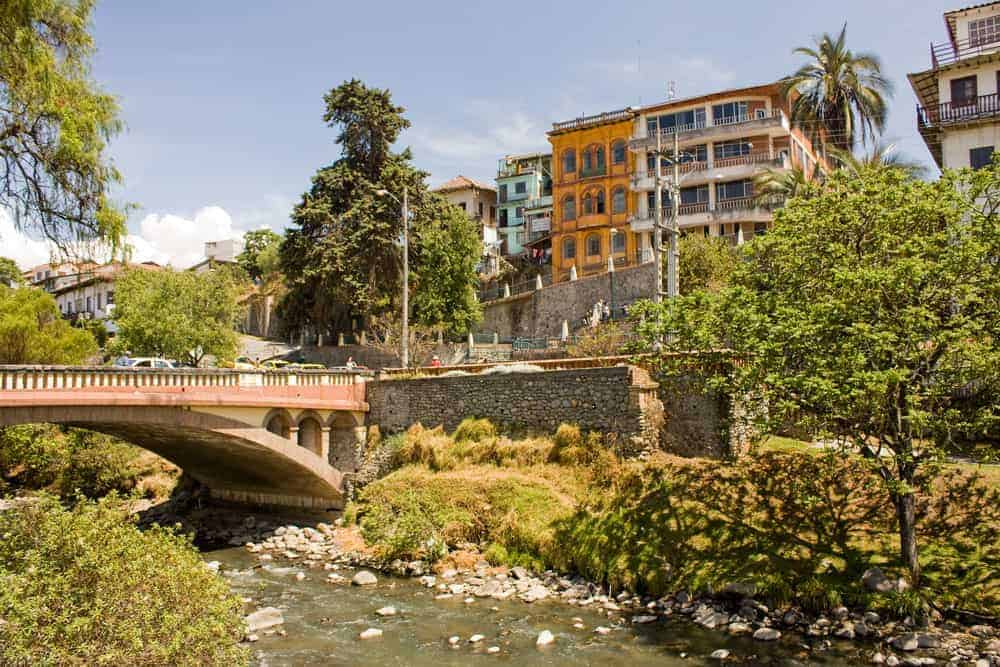
Why We Chose Cuenca Ecuador
We have been living in Cuenca for almost a year now. Why Cuenca?
- We chose Cuenca because of the climate: Cuenca is springlike all year.
- The elevation. Being up this high means that there are not many critters to worry about and no malaria.
- The health care. Cuenca is a center of education so the facilities are excellent.
- The cost of living. You can rent a nice 3-bedroom apartment here for around $180.00 a month or a house for $280.00 per month. You can buy a really nice house for $50,000.00 – $80,000.00. And your grocery bill will be about a third of what you are used to paying.
- The transportation system. We don’t need a car, the bus system here is excellent and the cabs are cheap.
- The safety. The people are friendly and as long as you travel smart (don’t try to stand out or flash your money around) you shouldn’t have any problems. The crime/safety statistics are much lower here than in many cities in the States and Canada.
- Location. There are no volcanoes near Cuenca and there is an airport here as well.
- The size, and atmosphere. Cuenca is a big enough city to have all the modern conveniences, but not too big. It feels like a quaint European town, walking in the city on a sunny day still feels like a vacation. There are four beautiful rivers that flow through the city, and many lovely parks to relax in.
- And last but not least, the language. Cuenca is known to be a very easy place to learn Spanish because they speak at a slower pace, and there are English restaurants, book stores and cafes in the city where you can make connections.
Things to Do in Cuenca
There are lots of outdoor things to do in and around Cuenca: horseback riding, whitewater rafting, hiking, climbing, and cycling.
Golf is also an option. Some of the courses include:
- The Cuenca Tennis and Golf Club
- The Los Chillos Club
- Los Cerros Golf Club
- The Casablanca Club
- The Quito Tennis and Golf Club,
- The Los Arrayanes Country Club
- The Guayaquil Country Club
Curious about where to move? Here are 7 reasons that Ecuador is the best country for expats.
We love it here, it’s actually better than we were expecting. I can’t really speak for the rest of Ecuador in terms of safety, but Cuenca is a wonderful place to live and explore from.
We have been to some of the smaller towns around Cuenca and we can picture ourselves living there as well. We have an upcoming trip planned for the Coast, so keep your eye open for that post sometime in August.
Why We Sold It All to Move to Cuenca Ecuador
When we lived in Canada we had our own business, home (a fixer-upper) and car. We were also homeschooling our daughter. Things were very busy!
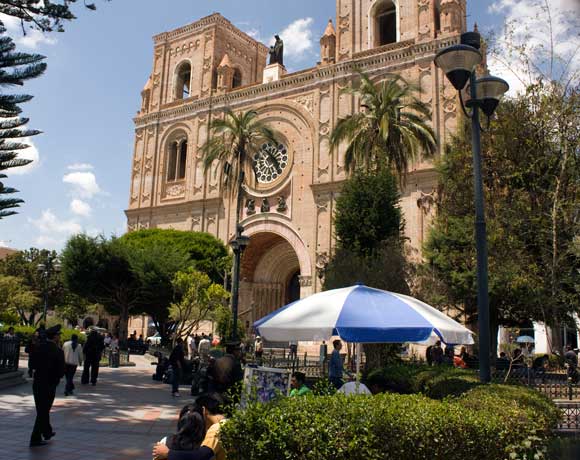
We were so occupied with making a living and fixing up our home that we didn’t have the time we wanted to do the things we loved to do as a family. Our daughter was growing up fast and we wanted more time with her.
So we started searching for a place where the cost of living was lower. With a lower cost of living, we would work less and have more time to enjoy our family.
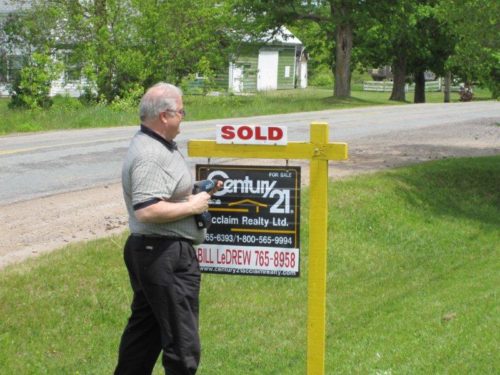
We did a lot of searching, we even took a trip to Margarita Island, Venezuela to see if that would be right for us. When that didn’t work out, we started looking into Ecuador.
Ecuador stood out to us because they use U.S. currency, and even though we are Canadians we could easily set up a U.S. bank account. We also liked that the country had lots of travel opportunities. It’s kind of a small country, but with the Galapagos, the Andes, and the Amazon, there are lots of places to explore.
As we looked into Ecuador, Cuenca quickly came to the top of our list. Cuenca is the third-largest city in the country, the high altitude means no mosquito-borne diseases and the climate is nice, not too hot, not too cold.
There are also lots of good hospitals and some modern conveniences like shopping malls, grocery stores, and movie theaters.
So we sold everything and moved in 2009. It was amazing to start over like that! And it was also very challenging. We didn’t even speak Spanish, we didn’t have any work and we had never lived in a foreign country before.
Sound crazy? Well, doing that crazy thing made us push ourselves to learn news ways to support our family, to learn a foreign language, and adapt to a new culture. All of those things made us pull closer together, become stronger and more resourceful. The move also gave us what we wanted, more time to do the things we loved doing as a family.
Parque Calderon in Cuenca Ecuador
I Heart My City: Bryan’s Cuenca, Ecuador
This is a post that I wrote for National Geographic Intelligent Traveler Blog for the series: I Heart My City. We were invited by Gio Palatucci to highlight our city on National Geographics Intelligent Traveler Blog.
Check out the post on National Geographic Intelligent Traveler Blog
I Heart My City: Bryan’s Cuenca.
Cuenca is My City.
The first place I take a visitor from out of town is Parque Calderon. It is beautiful and a great way to see the city. And there are awesome cafes and bakeries on every street.
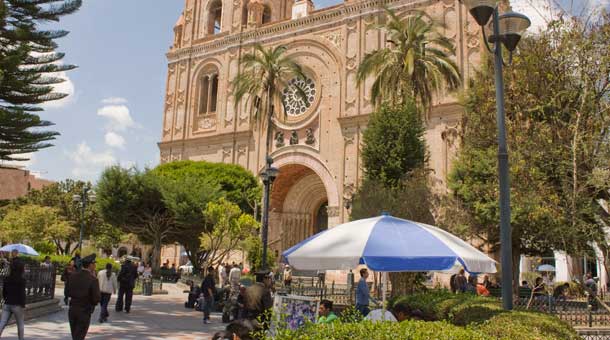
When I crave amazing pizza I always go to Tutto Freddo. They aren’t a pizza shop – in fact, they are famous for their ice cream, but they also make the best personal-size pizzas around. Less than $5 for an 8″ made-to-order pizza and bottle of coke.
To escape the beautiful colonial architecture I head to Mall del Rio – Cuenca’s largest commercial development – complete with the latest multiplex theater, bowling alley, and huge food court (yes, even with Burger King). It’s a palace of steel, glass, and concrete.
If I want to waste three full days I go to the Transit Authority to register my car for the year. When I purchased my first car, it took more than a week of running around to municipal, provincial, federal government offices, the Red Cross, notaries, and a driving school collecting original documents, paying taxes, and making triplicate photocopies of everything. I treasure my vehicle registration – I even had it laminated like everyone else here.
For complete quiet, I can hide away in Paradise Park. Well, not completely quiet, but just about as good as it gets in a city. It is super relaxing – little kids and families playing and a small river runs through it.
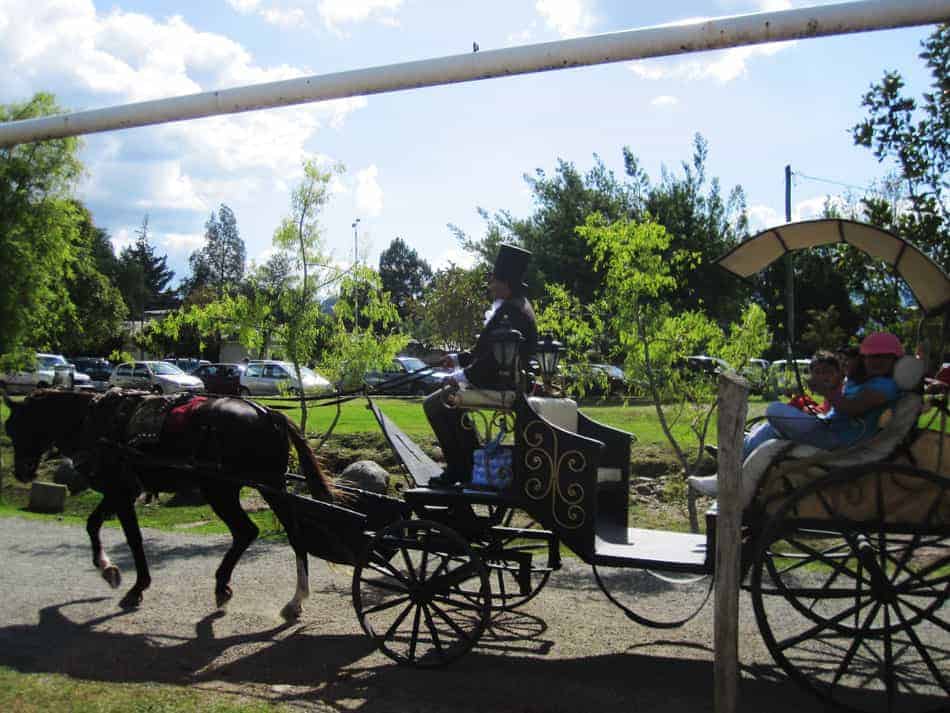
If you come to my city, get your picture taken with the flower vendors at the flower market off of Parque Calderon. The setting is beautiful and they are quite willing to pose for a photo (especially if you purchase some flowers). One lady even agreed to be filmed when we were shooting the House Hunters International episode.
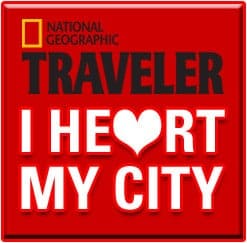
If you have to order one thing off the menu from Creta it has to be the filet mignon. Good beef is hard to find here – and it’s the best that we’ve had yet.
La Victoria is my one-stop-shop for great electronics (think Cuenca’s version of Best Buy – much smaller but still the best selection around).
Locals know to skip gringo pricing and check out the real prices instead. It’s long been said that there are two economies here. Sometimes due to skin color, and frequently dependent on your ability to communicate in Spanish, the gringo price can appear. After a while, you will learn that taxis never cost $10 and seldom $5. And that 5 apples don’t cost $3.00 like back home (maybe $1).
When I’m feeling cash-strapped I go on the bus ($0.25), buy some Yuca Bread ($0.15 ea), sit on a bench in Parque Calderon and people watch. Our whole family can do this for less than $4.00.
For a huge splurge, I go to an all-you(I)-can-eat-breakfast-buffet for $12. It comes with everything and it’s all hot and fresh. It can’t be beaten – just one block off the main center.
Photo ops in my city include the old town architecture, flower market and Parque Calderon (yes, again) and the best vantage points are from the restaurant above Fruitalados and from Turi – a look-off south of the city.
If my city were a celebrity it’d be Johnny Depp – sophisticated yet quirky and a little eccentric.
The most random thing about my city is the weather. No one knows if or when it will rain or be extremely hot. You can start the day with an insulated jacket and scarf, be down to a t-shirt by noon and have a rainstorm in the afternoon.
My city has the most soccer-obsessed men. Of course, the word obsessed is a little strong, but how else can you describe men who work 12 hours a day and find the time/energy to play soccer for an hour at lunch? And on Sunday. And after work. Yeah, soccer is pretty important here.
My city has the most friendly women. Friendly in a social way. They make conversation at grocery stores, restaurants, and on the street. We seldom go downtown without chatting with a local Cuencana.
In my city, an active day outdoors involves running errands in the city (everyone walks everywhere). On a day off, almost everyone heads to a park. There are some great hiking places just outside of the city – the city is surrounded by mountains.
My city’s best museum is Museo Banco Central (Central Bank Museum). It has everything from a complete history of the country and its indigenous people, to restored Incan ruins and an amazing aviary. Count on spending 3 hours or more exploring and learning about the area.
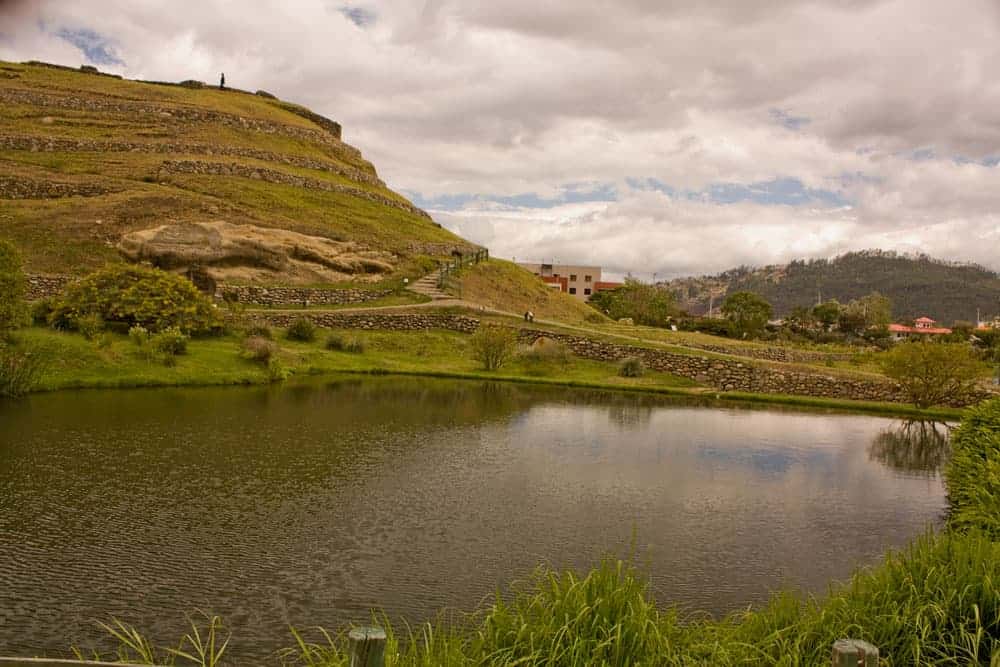
My favorite jogging/walking route is Avenida 12 de Abril. It has wide sidewalks that run alongside the Tomebamba River. When it hits Solano Avenue, there’s a stone staircase that leads into the old town.
The mall food court is the spot for late-night eats. Because everything else shuts down by 7pm. The mall is open late – until 9pm.
To find out what’s going on at night and on the weekends read the local paper or check the tourist bureau – they have a full listing of everything going on. There are lots of free events and concerts.
You can tell a lot about my city from a drive from the airport to the center. You’ll pass modern apartment buildings, luxury car dealers, adobe houses, and colonial architecture.
You can tell if someone is from my city if they sing while they speak. Cuencanos are known throughout the country for “singing” as they speak. It is thought to be one of the most beautiful forms of Spanish.
In the spring, summer, fall, and winter you should try to remember what season it is – because nothing changes here. Sometimes it rains a little more. Sometimes the sun is out more. The exception is November when you can see the trees on Avenida Solano bloom into an amazing purple, our daughter loves it.
A hidden gem in my city is the hot baths in Baños (not the big one near Ambato – Cuenca has its own hot springs). You can swim in natural hot springs under the stars and then dine in a fine restaurant at Hosteria Duran. Just a 20-minute taxi ride from downtown.
For a great breakfast joint try one of the breakfast buffets at the expensive hotels. For $8 to $12 you can stuff yourself (not that I would know) on a huge variety of bread, cakes, fruit, eggs, and breakfast meats – oh, and cereals, fresh juice, and coffee. All with amazing service and luxurious surroundings – and for the price of fast food back home.
Just outside my city, you can visit Chordeleg. It is just a 45-minute drive and is famous for silver jewelry. There isn’t a woman in the world (or husband, right?) that wouldn’t love to spend a couple of hours looking at the handmade silver jewelry. It is very inexpensive.
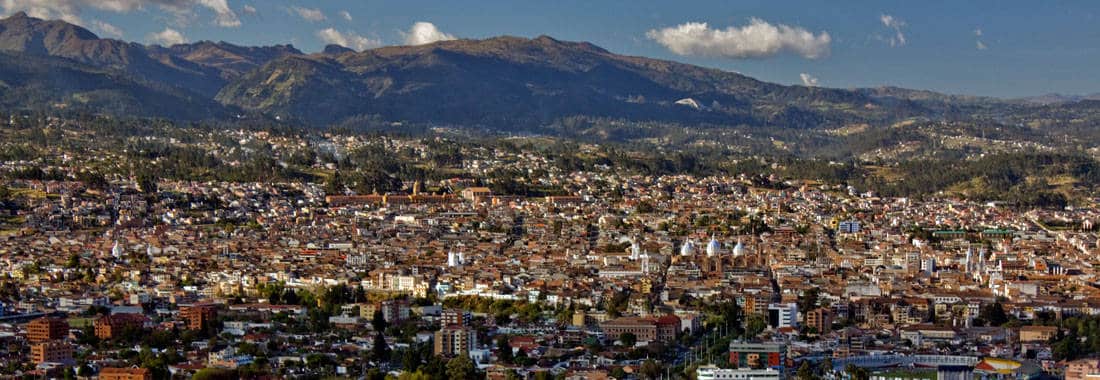
The best way to see my city is on foot. Cuenca is a walking city. There is no other way to take in the architecture – or find all the great bakeries.
If I didn’t live in a city, I’d live on the beach. It was a dream of mine before we moved to Ecuador, but we decided as a family that the Andes mountains fit us better. And guess what? We were right!
The best book about my city is one I have yet to find. All we have so far are travel guides – and they don’t represent Cuenca well at all. Somehow a list of restaurants and hotels isn’t very compelling for such a beautiful and diverse city. I’ve seen some Spanish ones downtown that I’ve got to check out.
When I think about my city, the song that comes to mind is Beautiful Day by U2.
If you have kids, you won’t want to miss the $1.50 DVD stores and all the ice cream shops. Gourmet ice cream for $2.00 or less – it’s a kids heaven.
Roasting cuy (guinea pig) and pigs on every street corner could only happen in my city. A little shocking to see at first, they have become a familiar part of life here. No, I haven’t eaten the street food yet. Maybe next year…
My city should be featured on your cover or website because it is a fabulous jewel that deserves more attention than it gets. If someone is planning a first-time trip to South America they should start in Cuenca and get their Latin legs. It’s like South America for beginners.
Expat Profile: Dena Haines in Cuenca, Ecuador
And to close out our guide to living in Ecuador, we’ll share Dena’s expat profile. This was written in December 2010, so some details have changed since then.
When did you get the idea of living in Ecuador?
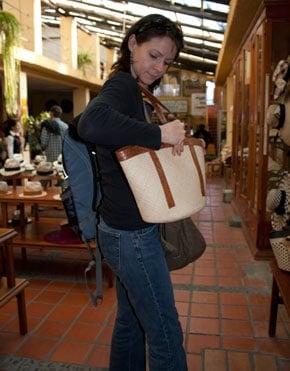
Bryan and I always had the itch to move abroad, both before we met and after we were married in 1999.
When our daughter came along in 2000 we decided to wait until she was, what we felt was a good age to make a major move.
We wanted to move to have more time to spend together as a family, somewhere less expensive so we wouldn’t have to spend so much time working.
We also wanted to give our daughter the gift of a second language and the richness that comes with being exposed to a different culture.
So when she was around 7 we began seriously sorting out our options.
We had a house and business that we had to sell, and we needed to narrow down the options of which country would best suit the personality of our family.
How’s your Spanish?
The primary language here in Ecuador is Spanish, and we are learning slowly but surely.
We didn’t know any Spanish when we arrived, so it’s been a steep learning curve. After about a year and a half, we can understand most of what we hear, and make ourselves understood.
Knowing the language before arriving would have made things much easier, but sometimes if you wait, you never make it because things keep coming up.
I would say that if you know you can’t move for a year or two, learn Spanish, but if you can move now – just do it.
I do think it’s important to learn to speak fluently while living here, but it takes time and it’s a bumpy road, so don’t stress to much as you work to progress.
What do you do?
Bryan and I are both writers. Bryan writes for About.com, a New York Times Company, as do I. We both blog here on GringosAbroad.com and I do some travel writing.
Bryan is a photographer, and I do some graphic design.
How do you find the cost of living in Ecuador?
We are very happy with the cost of living here. Because things are less expensive we only work part-time, and have more time for other things.
What do you love about Ecuador?
Wow, what do I love about Cuenca? A lot! The culture is more laid back, people don’t worry as much about having the best car or clothes or house. Family is very important, and Ecuadorians are warm people. The climate, cost of living, food . . .
One thing I don’t like is standing out. Because we look at different people stare at us, this is not a big deal but I’m the type of person that likes to just blend in.
We read all kinds of weird stuff before we moved, we got the feeling that we would be targets of all kinds of scams, like being sprayed with mustard . . . but we’ve never even seen anyone being scammed, or heard any of our friends talk about being scammed.
The housing here is very nice. Lots of new homes and apartments to rent and it’s very affordable.
The only advice I would give is to do your research and be realistic. If you don’t enjoy really hot weather, you shouldn’t buy a place on the beach.
If you like to feel secure, make sure you move to an area that had the proper infrastructure in place to give you what you require. Oh yes, and if you have the means and desire to do it, do it now! 🙂

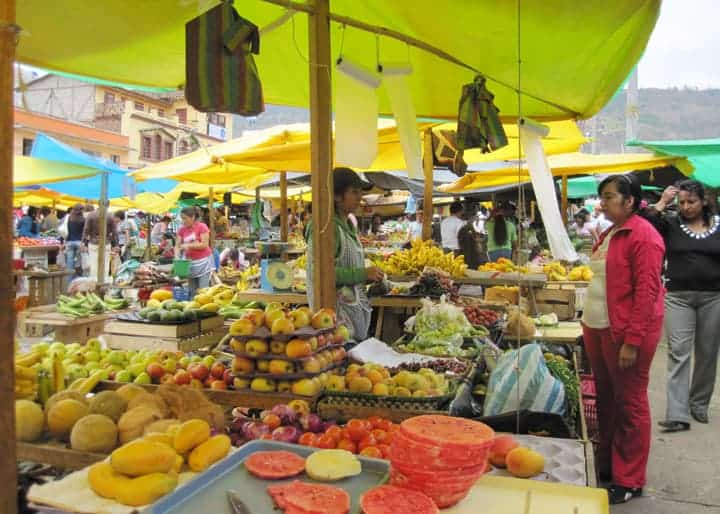
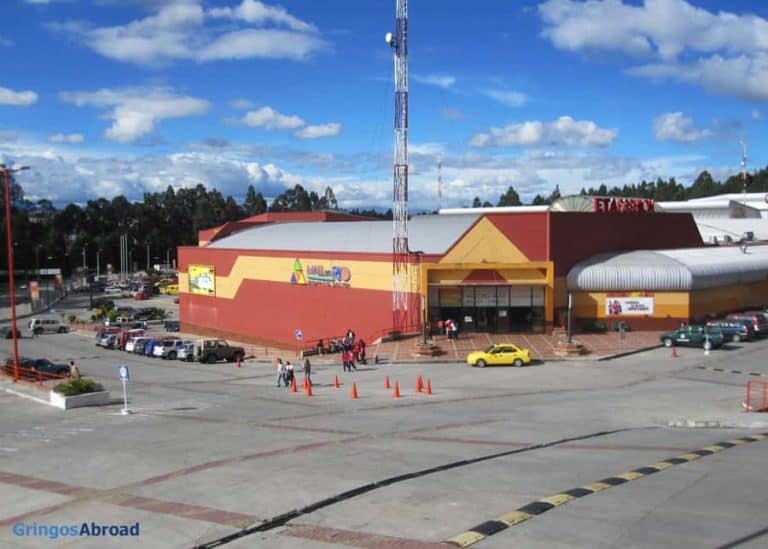
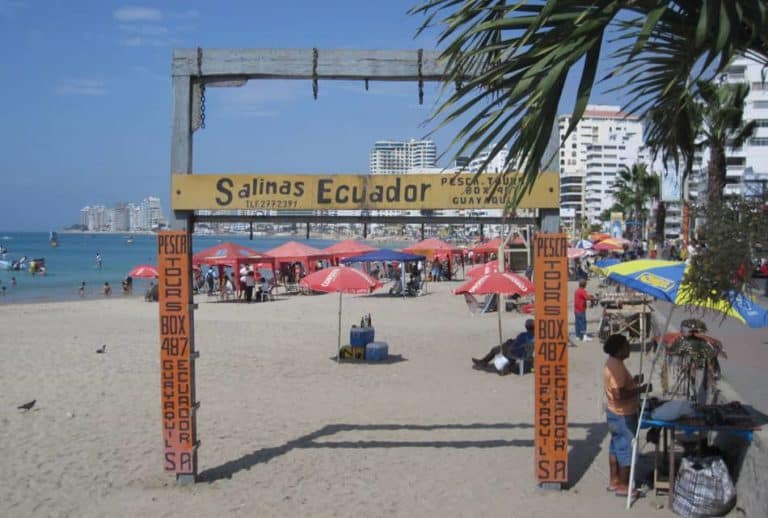
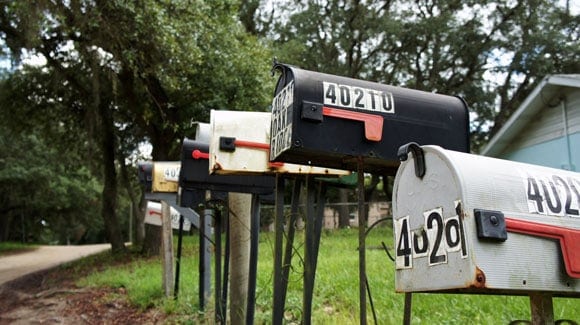
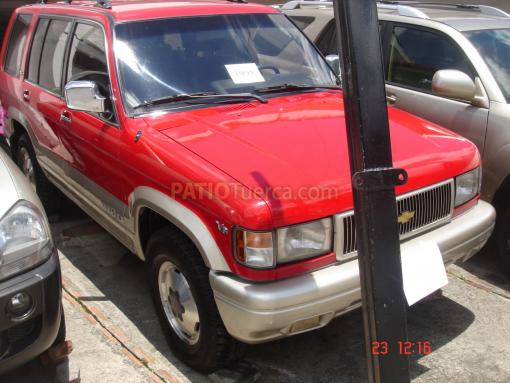

What could one expect the quality of life to be in Cuenca with a net retirement income of $75K-$80K from the USA? My daughter-in-law is from Ecuador. Her padre is a PhD Physicist working for a major manufacturing corporation in the USA, and her parents recently built a new house somewhere in the country for their retirement years.
Measuring or comparing quality of life is difficult. With an annual income of $75K, you would have everything you need and lots extra. When we first moved to Cuenca (in 2009), our family of three lived on about $1000/month. And this was before we knew how to shop and live like a local.
Of course, prices have gone up since then, but with $6K/mo, you won’t have much to worry about.
I have completely enjoyed your writing. Often broke out in a smile. I have been researching about everything Ecuador for months and after reading your articles I have a much greater sense of life in Cuenca than the total sum of everything else I’ve read. Thank You 🙏
How do I find reasonably priced apartments? Don’t need to be in the city center.
Here’s a good place to start https://storyteller.travel/ecuador-real-estate/ There is a section that covers finding rentals in Cuenca.
@Bryan Haines, I’m surprised you didn’t list GringoPost in your list. Available rentals/sales every day, in English, in Cuenca.
That’s true, there are many English speakers offering real estate to incoming expats.
I’m not certain of the current situation there, but I expect that it’s similar to while we lived there. English listings often exploit non-Spanish speakers. Here’s more about that: How to Choose an Ecuador Real Estate Agent.
2 couples on YouTube, expats that started out in Cuenca have left because they said they never could adapt fully to the altitude. Both couples were there for some time, so it’s not like they didn’t give Cuenca a chance.
HI Bryan & Dena,
We enjoyed reading about Cuenca. We’re retired and in the process of selling our home, which is in a suburb of Atlanta, GA. Once our home is sold we plan on traveling to several non-U.S. locations before we decide to where to put down roots. Ecuador has been on our bucket list for 10 years and we would like to take a one month visit to Cuenca. If possible, can you recommend someone we should contact about either renting an apartment for one month or staying in a hotel?
Best regards,
Bill and Brenda
I am travelling alone and would like to come stay from mid October 2020 to March 1st 2021, seeking clean inexpensive furnished accommodation bachelor or small one bed outskirts of Cuenca is fine as I will purchase a small motorcycle, I’m seeking a place to visit get accustomed to the culture and eventually move permanently in the next few years as I travel back and forth,
I am not wealthy infact my divorce took just about everything, so my next few years earnings will pretty much be all i have. Any input via email would be greatly received
Gracias
Gregory
I lived in Ecuador for 90 days. Thought Cuenca was iceberg city….loved Zamora, south of Loja where I felt too many drugs in area…went to Vilcabamba…made lots of friends…not much to do…but ad artist writer it was OK…lots of parties…Loved waterfalls on bus ride to Zamora…could walk everywhere and take collectivo to Loja for supermarkado…people super friendly…go and explore for 90 days…see what climate you like…then drcise…I am in Guatamala now…hate it …getting teady to leave the country
Climate is also subjective. In the winter, highs are often in the low to upper 60’s. “Cold” days are when the temps don’t climb much higher than the mid-50’s. The lack of central heating leaves some feeling cold for days at a time (since the cold snaps seldom last more than a week or so). As for hot, most “hot” days are in the low 70’s. The main issue is our proximity to the sun. When the sun is out, without a hat or other way to cover your head, you will indeed understand what an ant feels like under a magnifying glass. I’d prefer to say that it doesn’t get hot here at all. But at times, you can feel as though you’re going to burst into flames. Other than that, the climate here is amazing!
Been here 3 weeks, will return permanently here in March. My observation to date is, the happiest folks seem to be the ones who adapt to Cuenca, and not expect Cuenca to conform to their perspective on what “should be”.
Also, I’ve noted that while people in the U.S. complain that immigrants don’t learn English, they come here thinking that same practice is completely acceptable. Just because a person can get by with a basic few words doesn’t make it right. Plus, what a wonderful experience they are missing, not being able to speak with the people they see every single day!
Thanks for your valuable insights.
I like relocate from Canada in a year.
Also I like to visit for 5 days in next month August to how I feel before taking final decision.
Will you be kind enough to contact me by e-mail please.
Kajchow@gmail.com
Thanks a lot.
Hi kajal,
How is your experience in Cuenca. As of Indian origin I would like to find out more Facility point of view. Currently I live in Florida USA. Thanks
Pollution, especially in the city centre, is horrible, but it afflicts most everywhere in the valley. Anyone suffering from allergies or any respiratory condition should avoid Cuenca. Actually, anyone concerned about living a long and healthy life might want to strike Cuenca from their list. It’s worse now than it was when I visited 5 years ago. No city deserves your currency if they don’t act to protect their own residents, much less visitors. Great city, BTW. Food, culture, weather, etc. But no amount of that can compensate for an unhealty environment and early death.
You’re right, the pollution is bad. From the buses. Other than that nor I or my grandmother had no problems with allergies, & hers are very bad. We are back in Texas and she can’t breathe like she could in cuenca
I adore meeting new people, adapting to new cultures, learning everything I can for my personal growth and collaborating with others to reach long-lasting diversity, partnerships, and meeting company goals to secure such.
I am considering the area with an elevation higher than Cuenca. I am sorry do not know which direction from Cuenca. Have a pen pal who lives above 10,000 feet out of Cuenca on a Ranch.
Do the same pollution problems exist if you get out of the city 30 minutes to an hour.
I would not do the 10,000 but 8500+.
Thank you for your response and opinion.
Betty
I am expecting to go to Cuenca in July I will try to live there.I have a little dog and I will need a small apartment prefer A/C which accept my dog I speak Spanish and will like to live close to the center but out of the fumes.If anybody could give me some advice I will appreciate it thanks.
If you relocate near the Yanuncay River you will have cleaner air and enjoy a more quiet environment. There are many new buildings especially along Via Misicata and the #27 bus can take you to the center of town within 20 minutes. Once the light rail begins to operate the time should be cut to about 12 minutes. The area that I refer to is also known as “El Barrio de la Ferro Tienda” which is a neighborhood around a supermarket with that name.
In-so-far as being a victim of crime…
Always best to learn “street manners” so you present yourself as a sheepdog and not a sheep. Wolves are lurking everywhere in the world and a sheepdog is always on the lookout for trouble.
In the 2 years I stayed in cuenca I roamed the streets almost every night and never ran into any trouble besides 1 time around 3 am across the bridge of Solano to Calle largo. In front of the club “socio da” or something like that
excelent. Muy buena information
I am more interested in the availability of rental properties for long-term leases that have horse accommodations or facilities on them and they’ll have expense or Ethan is in finding one to two horses to purchase once I am there and have a place to keep them or is it more practical to board your horse is add a boarding facility nearby what is your experience and your recommendations I have read your articles on what you did as a employee with a few of the horse facilities out there in your ownership of many horses once you were living there and the difficult transition when you no longer had the acres of pasture to feed your many horses.
Thanks,
Darcie Crawford
It may be hotter or you may burn more easily in Cuenca, but it is not because you are closer to the sun. The sun is 93,000,000 miles from earth. A few thousand feet or so elevation is meaningless with regard to our star. What matters is the sun being directly overhead (because you are on the equator) and the air being less dense (because of the elevation). Wear a broad-brimmed hat and you won’t have to worry about the sun.
There is less atmosphere between you and the sun at elevation. I think it lends to burning
I’m planning on flying to Ecuador next September to check out Cuenca as a place aid like to live. I’m concerned about the altitude, just flying in there without a chance to adjust. I have had problems in Yosemite if I spend my first night at about 9000 ft elev. But if I camp the first night at 5000 ft, I can then be perfectly fine hiking and backpacking even up to 12,000 ft. Would it make sense to get on a bus in Cuenca and go to a lower altitude for a few days. I’m thinking Villcabamba or some other city that I could get to without too much trouble. Any suggestions? I need to get a really good map of Ecuador.
Hi Linda,
I don’t think it is necesary, Cuenca is just 7500 ft above sea level, so two or three days here and you’ll be ok.
Just avoid intense activities at the beginning.
You better buy a map before arriving here, try to get a really actualised one as there is new roads every year al around the country.
Cuenca is a very nice city, more peacefull than Quito or Guayaquil.
Kind regards
Pierre
Any suggestions where to get a really good map of Ecuador?
We have the National Geographic map of Ecuador. There are maps available within the country but we found this one just as good as any we saw in Ecuador.
Hi
I am from Venezuela but I am living in Australia. Because of the political situation in Venezuela I would love to buy a house in Ecuador and retire there…………….what chances do I have to do that?
If a person is interested in teaching English there, is it difficult to find employment?
Hi Sandra,
I am also hoping to make my move to Cuenca in October 2017. I would love to hear how your trip this month goes. Would you post your thoughts after visiting and whether that visit validates that you still wish to relocate to Cuenca. Thanks.
Katheryn
For the most current information a subscription to a magazine called International Living is great. They regularly report on various cities and towns in Ecuador. I have never been in Cuenca so I cannot speak of firsthand experience.
@Diana,
International Living focuses on a few areas where they have Real Estate to sell. They tout these areas up with their mouth watering descriptions and glowing reports from some couple who moved there. It took me three years to catch on.
I lived in Cuenca for 4.5 years. I loved it. It has the good and the bad like anywhere else. Beautiful country and you can be at the beach in 5 hour bus ride or under waterfalls in 2 hours in the mountains or be in the jungle with an 12 hour bus ride.
Am I the only one who doesnt enjoy living in Cuenca? I find some of the pictures awfully edited. You find many dog on the streets, and they poop everywhere, they are dirty and hungry and it makes you feel horrible because you want to take them in but you know you can’t because it means using more money on another. The jobs here are time consuming and you don’t get a good pay unless youre on a higher level or work all day. The buses aren’t that nice either, the bus driver drive wildly and don’t care if you fall of your seat. there is a lot more i dont agree with but this is my look on things and my opinion and my experience here.
I’m sorry that you aren’t enjoying yourself. You’re right – it isn’t perfect. And some sites don’t talk about the challenges of living abroad. But you aren’t alone – there are many expats that decide not to live in Ecuador.
All information found on this page is very valuable. Thank you! My husband an I live in Canada. We intend to move to Ecuador as soon as we can, likely in 2018. Once living in Ecuador, I would like to do telework for a Canadian organisation, and this requires that I can get an internet (from home) that is high speed and reliable. How is the internet situation in Cuanca? May be, you would also know in general for other big cities?
Sandra, I’d like to do the same but a little hesitant to try it alone. Do you know people there already to help you get around at first?
Was the trip safe to go alone?
Hi, I may have posted my comment in the wrong section before so I’m reposting. Do you recommending owning a home in Ecuador vs renting? I am not of retirement age yet and trying to make the best of the equity in my US home by moving and possibly investing in a home overseas. What are your thoughts on this? I am a single women, 56, who speaks enough Spanish to get around. Also, what are the best resources for expatriates there?
can you rent a house/apt where you can flush the toilet paper and not pay some Gringo price?
Hi Sandra – you’ll find lots of new info in our interview series: Ecuador expats.
All the best on your plans!
Hello Dena
I spent six weeks in Quito last summer and rented an apartment. The purpose of my travel was to get some cardio exercise and build health due to lower oxygen levels and which upon return to ground level result in more oxygen in the system. However, in Mariscal where I lived there was little to climb up or downhill in the neighborhood. Are there any places in Cuenca which are reasonably priced in terms of housing and food but are right next to hiking up or down a mountain for physical exercise? Housing has to be free from traffic noise and automotive exhaust pollution. I assume that I will not get robbed on the hiking trail.
We have lived in Cuenca since June of 2014. We are originally from Arkansas and came here so we could afford to retire. For me Cuenca is home. For people who are thinking of moving here I want to point out some potentially negative aspects of living here that others have not mentioned.
First, Cuenca is noisy. Ecuadorians have an expression: ” Silence is death, noise is life”.
Next, while from a trash stand point Cuenca is very clean, Cuenca is dirty. Wash your car, then park it for two days and you will need to wash it again. Dust is every were.
Then there are the roads. Very rough.
For me the good in Cuenca out weighs the bad, but others might find these issues a turn off.
I’m from NW Arkansas and wanting to spend the summer in
Cuenca. I’m a little hesitant to go alone all the time. Is it easy to got to know expats there that will help guide you and help you avoid crime and unhealthy situations?
Hi. I live in the city of Cuenca in Ecuador ..
I am selling a house of 130m2, it has 636 m2 of green area, two bedrooms, two bathrooms, living room, kitchen, dining room, study room, barbecue area.
The land where this housing is 756 m2, and is located in a private urbanization.
It is located 10 minutes from Cuenaca, is in the field of Challuabamba.
It is ideal for a retired couple.
The price of this house is $ 160,000.00.
Any information my number is +593 98300 3785
Hi, it is so nice to see things posted by fellow Canadians. We are looking to relocate in about 4-5 years and are considering Ecuador. What preparation did you do before moving? When do you suggest is the best time to visit Ecuador to see the weather at it’s worst? Living in Canada, I can’t imagine anything worse than our winter.
Thx
Any info on how altitude may affect new comers? I’m from US and sea level. I’m concerned about the first days acclimating to altitude. Advice? Thank you!
Hi Beth,
So did you make the trip to Cuenca? How did the altitude affect you. I’m looking for info for the same concerns, and whether it might be a good idea to get off the plane and get on a bus down the mountain to a place about 5000 feet for a day or so. I’m hoping to make it out next September, 2018. I’d love to hear from you.
First of all, if you fly in to Guayaquil you are already at sea level. That is what my wife and I did when we first came here 3 years ago. We spent our 90 days (standard tourist visa) travelling all around the country to check it out…backpacks only, no checked baggage…we spent 3 weeks bussing from town to town up the coast – Ballenita, Manglaralto, Montañita, Puerto Cayo, Olon, San Clemente, Canoa – before heading up into the mountains. We took a few days to go up to Quito hoping to acclimate to that altitude. We are small town folks so Quito was really outside our comfort zone. We quickly headed north to Otavalo, Cotacachi and Ibarra. Cotacachi was the first place we stayed with a high percentage of gringos (a nice, small town).
We did a short tour into the Amazonia – Cuyabeno river (which was amazing) – then headed southward…Baños, Cuenca and Vilcabamba. We stayed a couple of weeks in any place we liked since we had no fixed itinerary. By that time we were a bit tired of long bus trips. I would suggest trying to limit your range to no more than 5 or 6 hours at a time maximum…most Intercity buses are excellent and comfortable but after a few long stretches we opted to fly from Catamayo (the Loja airport) back to Guayaquil and then spent our last week in Salinas. While this “Miami Beach south” may be for some, with tall high-rises all along the beach and lots of bars and restaurants catering to touristas, it was not what we wanted.
When we returned the next year we spent some time again beach side but ultimately decided Cuenca area was for us – big enough to have tons of things to see and do, from seemingly non stop celebrations and cultural events to great selection of restaurants, museums and musical entertainment (a lot of it free!)
Coming from Canada the weather was a welcome relief from our winter, although we always carry a sweater or light jacket and small, collapsible umbrella at all times. Typically it can be cool in the morning, very sunny and warm by noon and then a brief period of wind and (sometimes heavy) rain in the early evening. Actually nicer than most Canadian spring days.
We are now here on our fourth visit and applying for our residency visas.
Ultimately we plan to actually find (or build) a place outside the city away from the noise and diesel fumes – although supposedly the city is planning to modernize their busses and the new Tranvia (a light rail transit line, construction of which is now a few years behind schedule) may be completed by next year.
Even though the gringo population seems substantial it is still probably only a small percentage overall – the city is around 500,000, but we prefer country living. Still, it will be nice being within a short drive of this vibrant city!
There are some advantages of being a half hour (or maybe more?) Outside the city. That distance can dramatically change the climate – several hundred to a couple thousand feet lower elevation leads to warmer, often a bit drier, weather. Depends on what you want. This was one of the features of Ecuador that really appealed to us as we consider the coming impacts of climate change, especially in Northern hemisphere. We consider ourselves early climate refugees!
Hi Knowlton,
Information provided by you is very helpful as I pursue relocation / migration to Ecuador along with my spouse, from India.
Regards
Hi Shankar, I am Vimmi from India. I also want to relocate to Ecuador. I just want to know have you already moved there? If yes , can you guide me?
For you the cost isn’t too expensive but for the cuenca people is another story, im really worry cause the problems that will appear in the future for example i afraid for the day when the cuencan people get upset due a to a high cost cause of those foreigners that decide to live in the city
You make a valid point – this has come up many times.
Have you seen any studies or statistics that show the affect of this type of situation? I would love to share that with our readers. While I can see how the rent / property values can be affected in certain areas of the city, I don’t know the true affect that a few thousands of foreigners could have on a city of hundreds of thousands.
It is gentrification, it most definitely makes things harder for the locals.
I understand the concept – but what is the tipping point? How many affluent expats does it take before change begins? Can an influx of an additional 0.5% or even 1% change a whole city?
For a year we lived in the most expensive part of the city – and foreigners were still a small percentage. There are many wealthy Cuencanos – easily more than all the expats. Most of our neighbors drove newer cars and wore nicer clothes than we did. I think our truck was the oldest vehicle in the parking garage. Of course, the very wealthy live on their own estates – of which there are many in Cuenca and surrounding areas. Many expats move to Ecuador because they are poor – and can’t afford to live in the US on their social security income.
That is called gentrification and means that a city is undergoing demographic and economic changes. There is a lot of new construction that caters to foreigners and prices are on the rise overall. One day Cuenca might become like Nice or Dubai on the international scene with many locals being priced out. This phenomenon is happening in many cities worldwide including in the one I came from Jersey City, NJ. In the long run this will help boost the local economy and quality of life so the country will welcome it.
People that come from other countries with retirement income will be spending their money in your city day after day after day. They will spend on taxis, restaurants, museums, clubs, supermarkets, clothes, translators, cleaning people,
Cuencanos make more money with them there than they would make without them there. Foreign income being spent there brings more jobs in certain industries too.
I will move to Cuenca in September to begin an English teaching job. (I currently live in Turkey and previously lived in South Korea.) I understand being care about crime everywhere. But, I have also read the Cuenca can be very noisy all the time. I am a light sleeper. This may sound silly, but is Cuenca as noisy as another blogger writes? Is there a particular part of the city that is quieter at night and so might be more suitable for someone like me to live. Thank you.
Hi Carol,
I’m Berke and I’m from Turkey.I’m wondering if you moved to Cuenca.I’m currently living in Turkey and I would like to go to Cuenca in may like for 10-15 days.I just want to have a great vacation.I want to rent a car and travel around.Do you think is that safe? and also I wonder If 1000-1500 usd is enough for having a great time over there.(That money should include the hotel/motel expense.)
My wife and I discussed moving and retiring in Cuenca. We have changed our minds, based somewhat on the crime rates in Cuenca. Not so much because of the amount of crime, but on the response to the crimes by local police. I’ve been reading that they solve 2% of crimes committed in Cuenca. That is shocking. It’s as though criminals have no deterrents. They feel little risk in being caught or prosecuted. They can rob you on Monday and return on Friday to rob you again. It is probably like sport to them. You have to ask yourself is the poor response to crime by Cuenca police a result of corruption within the police department? Is it more a result of having too few officers to patrol and respond to emergency calls. Does Cuenca even have something like a 911 call center we use in the U.S.?
My wife and I watched a wonderful episode of House Hunters International a while back. It followed an American couple who moved to the pacific coast of a Central American country, to open a hostel. Not long after that episode aired, a group of criminals raided their property, beat them, tied them up, robbed them, and fled. I don’t recall all of the details. There may have been a sexual assault as well. But the most important aspect of the experience was that it took days for law enforcement to arrive on the property. That’s right, days! Not minutes. Not an hour, but days. People get so excited about moving to a foreign country, they don’t bother to find out if there is adequate law enforcement nearby to protect them or respond to a call for help. It turns out, more often than not, you are on your own. The couple recovered and moved back to the U.S.
We have been invited to join friends in Cuenca later this year. I know we can handle the weather and the traffic and our lack of Spanish. We would enjoy most of the food. We could ignore the fireworks or chickens or stray dogs. What we may not want to gamble on, is getting into a cab operated by thugs who plan to rob us,, and then finding out the police have little interest in catching them. I remember feeling that way the second time I visited New York City and was a victim of crime. People acted like I deserved it. Like I was to blame because I didn’t take enough precautions. As a former police officer, I know I can avoid most situations that put us at greater risk of becoming victims of crime. It would be unlikely that we would make dumb mistakes and hang out in high crime areas. But like Las Vegas, you want the odds in your favor at all times. And sometimes the best odds are to stay home. Maybe we’ll cut our flying time in half and fly to Hawaii for a couple weeks vacation, and not test to odds in a foreign country.
That’s terrible!!! I just watched that episode. Was the the one with the ten year old daughter named Drew?
I am in Cuenca now. Seems to want to rain most days but then holds off, Tshirt from 9 am til sundown. Unless you are learning spanish you may have a hard time. /////people are not all that friendly unless you can bond by saying aomething about a kid. Yes I know enough to hae a conversation. Coffee much cheaper food at non gringo restaurants cheaper. I prefer Nicaragua people are more goofy and imperfect. However I already live in heaven Comox BC
We’ve found Cuencanos to be very friendly and helpful.
Visiting for a vacation is a much different experience than relocating. If someone visits for a few days/week, their opinion is influenced by just a few people. Living somewhere is completely different.
Thank you so much for the great information. I and my family plan on visiting Ecuador in March, with the intent of moving there in the fall of 2015. I am so looking forward to the lovely county. My niece and son speak Spanish, and my niece is actually a Spanish teacher. She hopes to find a job teach there. She has her ESL certification. My son is more adventurous, and hopes to find a job involving outdoor activities. He has a university degree, so I am sure he will find something there. I am a business owner, and insurance agent. I hope to find some type of part-time work or perhaps find the time to work on a way to sell our foods and desserts that my niece and I love to cook. Who knows. I am concerned about applying for the visas, etc. If you can offer any information on the best and most productive way to proceed with the move, that will be greatly appreciated. Hope to meet you during the visit.
No comment @ this time, but really interested in your advice & knowledge
you cam be robed any where. I feel I am robed just living In the U S. High taxes, Gas prices, The list goes Crime is everywhere. Where their is drugs. People will steal to support their habit. If your looking to move where there is no crime.Good luck with that. But if your looking to move were the weather is nice and the food is safe to eat and plenty of it. I believe Central and south America can give you what ever you need. The beaches and mountains are so close to one another. Living in Jaco Costa Rica. You have the beach and just 30 minutes you can be in the mountains and 10 degrees cooler. I think maybe we should think about what we can give . And not what we can take. We know how the lessons we have learned from in U S. Don’t make that same mistake else were. When we were poor and little life was much easier. Families much closer like we see in Ecuador and other 3rd world counties, And much simpler also. Blesses is the giver. Maybe we can share how we have polluted our rivers and lakes . So they don’t make the same misstate we have. It saddens me to see how the poor in 3rd world counties sleep on the streets in town. And know one cares about them. Crime,drugs, the homeless the poor are were ever you go. It’s not adding to the problem. If you want to retire and live out your last years in a place that is not to cold are not to hot. Has good health care and good food. I believe you can find it in Ecuador. After all it has been the number one retirement place since 1999.
Thank you for your positive comments. I’m retired and looking to move to the area. Can you tell me the best places not the most expensive places to look for housing. Are there folks there that will help with the transition?
In my opinion the best option is Cuenca, because is the city with the best hospital network nation wide, and may is little bit expensive, but have the best climate, is clean city, safety and the most cultural city of subamerica. you would love Cuenca, i am sure,
Hi All,
I ran across this post and thought I’d weigh in with my personal experience with crime in Cuenca. As a longtime resident of downtown Phoenix, I’m no stranger to crime in general (random gunshots are routine in my ‘hood, with occasional home invasions thrown in for good measure), and honestly I felt safer in Cuenca than I would in almost all the neighborhoods around my usual neck of the woods.
My tale:
My wife has lived in Cuenca for the past several years but I have been unable to join her due to my work here in the states. I finally had an opportunity to visit last September, and found the city to be wonderfully captivating – beautiful architecture, tasty food (by the way, thanks for the great cuisine coverage!), and generally friendly people, even if they tend to gawk a bit at my towering 6’7″ frame *laugh*.
Anyhow, my crime story begins on a bus ride from Cuenca to Yunguilla. We boarded at Terminal Terrestre, but I don’t recall the specific bus line we used. When we boarded, a helpful young man guided us to some empty seats and helped us place our backpacks in the overhead luggage rack. What we didn’t notice at the time was that this particular rack was adjacent to a sealed-off compartment (how’s that for foreshadowing?)
When we disembarked in Yunguilla, I realized that I had been relieved of my work laptop, my camera, and my cell phone during the ride. Of course we immediately reported the theft to the police at both ends of the line, but the response was somewhat lackadaisical and pessimistic.
Because the laptop belonged to my employer, I had to file a formal police report once we returned to Cuenca. While filing the report, the officer informed us that this particular type of theft has become more common lately and that there are a couple of different variations. Sometimes there is a child hidden in the sealed compartment who opens a trap door and ransacks luggage while the bus is in transit, then transfers the goods to another thief at the other end of the line. In the other scheme, there is actually a hinged flap cut into the exterior of the bus – once the thief knows where the luggage is positioned, they climb onto the roof, open the hatch and take whatever they want before the bus departs.
In the end, I was frustrated and angry for about 20 minutes and then I realized that there was nothing more I could do about it and set about enjoying the rest of my stay (hey, that was the end of the ‘working’ part of the working vacation, so maybe it was a silver lining after all!). The reality is that crime exists everywhere in one form or another, and one dishonest person shouldn’t color the entire experience. I’m certainly looking forward to my upcoming visit next month, hopefully followed by a long-term relocation.
My advice? Don’t be frightened – get out and experience the city, the sights, and the culture, but do be acutely aware of your surroundings at all times. The more aware you are, the lower your chances of being targeted.
-Rabbit
Hola Dena,
I’ve been following your flow for a couple of years now. I am from Quito but currently living in USA. I am plaaning to go to Cuenca in June with my two little kids. Would you be so kind and recommend a place for us to stay that is nice, safe and close to all ammenities?
Muchas gracias,
Carolina
In one of your articles you said that Cuenca is the most expensive city to live in in Ecuador. From the research I’ve been doing (on internet, of course), other cities such as Quito look more expensive. I have friends in Quito, but ruled it out immediately due to “big city” costs. Do you really think Cuenca is the most expensive city in Ecuador? I might be changing my search area. Thanks for great articles and a great site.
We haven’t lived in Quito or any of the other large cities. We have commented on what we have heard from other expats and locals.
I don’t really think that there will be that big of a difference. The real issue that needs to be addressed is: Where will you be happy? It isn’t that hard to adjust some aspects of lifestyle to meet a budget. But finding an area where you feel safe and happy is a bigger issue.
Once you choose a city, the question of where to live is still a big one – there can be a large range of costs within a city.
The “Spring Like” Weather of Cuenca seems to be an ongoing topic. But higher elevation makes the air cooler – it is less dense. Nothing to do with being closer to the sun.
Hi Ken,
When I mentioned being closer to the sun I was also talking about how you can burn quickly, not just about the spring like temps.
Skincancer.org has this to say about high altitudes and UV radiation – “Higher altitude means increased risk of sun-induced skin damage, since UV radiation exposure increases 4 to 5 percent with every 1,000 feet above sea level. At an altitude of 9,000 to 10,000 feet, UV radiation may be 35 to 45 percent more intense than at sea level.”
I also found this interesting from sunaware.org “This increase in the risk for sun damage does not happen just because at high altitudes you are closer to the sun. It also relates to air density. Think of a wool blanket- the thicker the blanket, the more warmth it keeps in. The atmosphere acts as a blanket holding in heat (generated by earth and sunlight striking the earth). At higher levels, the blanket is thinner, therefore it is cooler. However, the thicker the blanket the more direct rays of the sun are filtered, so as it becomes thinner, fewer rays are filtered and the risk for sun damage becomes greater.”
And kidshealth.org said this about being on the equator “extra protection is also required near the equator, where the sun is strongest, and at high altitudes, where the air and cloud cover are thinner, allowing more damaging UV rays to get through the atmosphere.”
Thanks for your comment. I had not done research about the relationship between sun damage, altitude and atmosphere before.
It isn’t just the altitude but humans have destroyed the Ozone layer that protected us from the sun. Seems a heavy application of strong sun protection and long sleeves and pants are necessary if you want to avoid skin cancer. I live in San Diego where everyone seems to have it and this is sea level. I have lived in several places over 6000 feet and take great precautions. I still got lip cancer and has to have surgery.
Hi Dana & Bryan, In spite of being robbed I am still going to remain in Ecuador if possible. I am wanting for social security money to get here from the US. And hope to have it this week some time. Due to my fear of retaliation from the bad guys I have waited longer then I would have liked. I started learning Spanish before leaving the U.S. and are still learning more each day.
I have friends that are interested in moving to Ecuador when they retire and I haven’t scared them away with my stories.
Your last post was spot on. Great work.
Beth
Hi Beth,
I’m sorry to hear that you were robbed. Sounds like you are being careful and that’s important. It’s good to hear that you are going to try and stay if you can.
All the best!
Greetings, what are the opportunities to buy a home in Ecuador for under $100,000, and would you recommend owning to renting? I am considering moving there from the US but am not of retirement age yet. I’m wondering if it would be a benefit to own my own home there. Any advice would be useful. I have some Spanish but not fluent.
Hi! I love your balanced way of putting things. As a family of five (three children aged 8, 3, 2) we moved from Poland to Andalusia a year ago, in the mountainous region of Malaga province and.. we find some common things between your live in Quenca and ours. We are about to create a website, mostly dealing with our daily life here, but it will be a bit different from yours because we live in absolute countryside, miles from ‘civilized’ asphalt roads. Here, the most characteristic are the white Andalusian pueblos, flamenco, and remnants of Arabic culture, combined with Mediterranean nature. So, this is what we hope to share with you soon. And even we are not going to move to Cuenca or the South America we are incredibly grateful for your wonderful stories, because they resonate with us really deep. Hasta luego amigos!!!
Thank you for all the comments on this post. We appreciate the time an thought that goes into sharing your view and opinion with us.
Excellent, balanced information. We tell everyone that we LOVE it here despite the challenges, but that it’s not for everyone. Best to come visit for several month to see if it might be a good fit. If, after visiting for an extended time, it seems that it’s not right for you, that’s okay. There are many others options in the world. Also, it’s really important to be patient and kind with oneself and with others, especially when the language is a challenge. We have found that most people are very helpful if we display a humble attitude. Don’t be an “ugly American” and you won’t be looked at and treated as one.
That’s so true, it has so much to do with our own attitude. And yes there are a lot of other options in the world, even here in Ecuador, it’s such a diverse country!
Thanks for commenting.
My wife and I have been contemplating moving to Cuenca for sometime now however we have a 7 yr old and I cant find many comments on having kids and how well they acclimate to a this culture. I homeshool him and we have been learning Spanish together for about a year now just in case we do make the move. We live in the U.S.
Kids under the age of 10 are like sponges and thus can learn a new language and adapt to a new culture at a quick more rapid rate than older kids (and adults). The key, I think, is to bring them while they’re young.
When my brother and I first arrived in Cuenca from Toronto in the early 90s, at the ages of 8 and 12, respectively, we adapted at very different paces. Within 4 months of arriving, my brother was fully billingual, gained a circle of friends and seemed to have moved past any homesickness he might have had for Toronto. I, on the other hand, went through a longer adaptatation process. It took a full year for me to become fully fluent in Spanish and another year to finally stop kicking and screaming about how my life was ruined. In my defence, this was a typical response for a 12 year old pre-teen who arrived in Cuenca before the Internet-era, who nearly fainted upon learning that in her new city there were no shopping malls or American brand fast food chains, no multiplex cinemas, and limited coverage of cable TV. (things are very different today, of course)
When I moved back to Toronto as an adult with my 4-year old son in tow, he became fluent in English within 4 months as well, and while he had trouble sleeping the first few months because he missed our extended families back in Cuenca, by the time we hit the 10 month mark, he learned to love the snow, grew a whole new appreciation for Halloween and began participating enthusiastically in school events. By the time we returned to Cuenca two years ago, my son turned 14, and he experiened a similar year of struggles before finally adapting. I’d say his transition took a full two years on account of his age, but today, at 16, he’s doing just fine and is already thinking about what he’ll study at the local university.
I have no experience with homeschooling, but my family (my brother, myself and my son) has done very well in the local private school system in Cuenca, albeit in different decades. It’s definitely a character building experience that makes you fearless. Parents who have a preference for homeschooling can continue to do so upon arriving in Cuenca with no trouble at all. So, there are many options available.
Melita, thanks for the reply. That’s the type of info I’m looking for.
Hi Stan,
Our daughter was 8 when we moved to Ecuador and the first few months were rough for her. After that she started picking up the language like crazy, making friends and settling in. We have always home schooled her so that part of her schedule remained the same. I think the constant nature of that routine was helpful for her because so many other things were changing.
We talk about how the experience of moving abroad has been for our daughter throughout our posts but I am planning on writing a series of posts focused on moving abroad with children and the challenges/joys that it presents to parents.
Thank you for your comment.
Hello Melita, I’m hoping you get this or that someone with teens that lives in Cuenca can give us some tips and advice on where teens can meet other friends their age. My daughter is 16 as well but graduating a year early so we’ll be moving this coming summer of 2015 from Phoenix, AZ. area. I guess I’m just wanting to know what to expect challenges wise and also fun for her, she’s very mature and sweet natured (wants to be a photo journalist) so I’m thinking volunteer work advice will be good as well as she loved her time she spent volunteering in Malawi, Africa. Thanks for any help you all can give.
Hi Stan,
While I do not have experience with taking a child to Cuenca, We did take our barely 8-year-old son to a foreign country without his knowing a word of the local language. We stuck him in the local school and he was speaking just like a local within about 5-6 months. Kids are very adaptable, I wouldn’t worry about his learning Spanish.
Hi Dena,
Nice article. One thing you just touched on with your pictures is the architecture, but I would like to hear more.
The city center in Cuenca is probably cleaner than the one in Quito, but there are a lot more people in Quito.
It would be interesting to hear more about the historical buildings in Cuenca because there seems to be blocks
and blocks of them. That’s just my impression from a weekend visit last year. Hopefully this year we will visit
longer and do more exploring.
Cheers.
That sounds like a good topic for an upcoming post. The historical buildings are beautiful, they are one of the things we really like about Cuenca.
First of all, what an excellent article and fantastic photos!
As someone who’se lived in Cuenca on and off for large periods of her life (and who can pass herself off as a local), I can say this article is a fair assessment of life in Cuenca. Everyone’s experience with this city will differ, particularly depending on what city and lifestyle you’re coming from. Being a city gal myself, here’s my two cents…
Coming from the large, diverse, multicultural city that is Toronto, Canada, seeing foreigners on the streets doesn’t faze me, unlike the locals here, who are only just getting used to dealing with massive floods of tourists who look and speak differently. This is why the misconception about foreigners being rich continues to persist. To counteract this, it pays to learn some Spanish, brush up on the real cost of things and to haggle – it sounds funny, but most merchants will actually respect you more if you at least try to haggle on the price of a product as opposed to accepting the first price they quote you.
Yes, crime is a concern here, just like in any other city, but if you listen carefuly among the locals, you’ll find them comparing today’s crime rates in Cuenca directly against the Cuenca of 20 years ago, which would make sense, since, as cities grow, they experience fluctuations in traffic, crime rates, and real estate prices. While I personally feel safer walking around downtown Toronto at night than I do here in Cuenca (the historical centre here empties out by 7 p.m.), I don’t find it’s a deal breaker. You just have to adapt your habits and be alert. (i.e. – leave the flashy Coach purse at home)
There are a few things that irritate me at times, such as how banks only open from 9 a.m. to 4 p.m. and how most businesses, aside from the only shopping mall in town, close at 7 p.m. (I mean, how the heck can working people find time to apply for a mortgage or search for a new outfit?) But again, this is only an irritant to me because I came from a city where banks and malls opened until 9 p.m. and offered full service on weekends. Since coming back to Cuenca, I’ve gotten used to the business hours here and have now come up with ways to limit my contact with the bank to two or three visits a year and take my husband’s suits to the dry cleaners before I go to work in the morning.
Being Canadian, I will NEVER complain about Cuenca’s weather, period. I just won’t. The fact that I don’t have to drive in the snow anymore has effectively shut down any complaints I may have had about Cuenca’s weather.
Ahh, the prices of food and consumer goods…a favourite, if somewhat controversial topic. My approach to this is to pick your poison. Yes, electronics and imported packed foods are ridiculously expensive, so are used cars when compared to the prices in the U.S. and Canada. However, the price of gas is still cheap here (unlike in Canada, where it’s bordering 5 dollars a gallon!), property and income taxes are quite low (we used to shell out $2500 a year in property taxes for an 800 sq. foot condo in mid-town Toronto), and a blow out at the hair salon here can be had for as little as $5.
Yes, I feel a pin prick when my son insists on me buying him a $5 box of Fruit Loops every week; the pin prick turns into a burn when I see that the price of a nice Chilean wine at Supermaxi costs the same as it does at the LCBO in Ontario (thieves also known as the Liquor Control Board of Ontario). But what, I ask, would our lives be without Fruit Loops and wine???
To balance things out, I choose to drive a basic, compact car with no frills that fills up on $14, have a ball riding my my bike all year long without freezing myself, and smile as I bite down on a whole wheat croissant that only costs $0.15 cents a pop. I also don’t have to worry about replenishing my wardrobe every single time the season changes, as my clothes are good here all year round.
I guess what I’m trying to say is that no place is 100% perfect; it’s all about how much you’re willing to adapt in exchange for a lifestyle that makes you smile when you get up in the morning. If you can adapt, be open minded and try to do as the locals do, you’ll do just fine in Cuenca.
Thank you for sharing your thoughts about life in Cuenca Melita. You’ve added to this topic and rounded out some of the things that I mentioned in the post.
Hi Dena,
My wife and I are coming to Ecuador the last week of November. We will be in Cuenca the last couple of days of our trip. Is there a popular restaurant or expat gathering place where we could possibly meet other Americans who have made Ecuador home?
Thanks so much.
Kind regards,
J Napier
Have you received any responses? We will be in Cuenca for 3 months this winter, and don’t know anyone there. Might be nice to make some connections when we arrive.
Perhaps you could post the places you found while you were there, after your return. Thanks.
Thanks for this useful information. As you say, there is crime in all cities and I don’t think that should be a reason to stop you enjoying living there. Cuenca sounds lovely.
The best think about Ecuador, is the varied climates, regions, and types of cities.
Like most of us on this site, we’ve come to, or investigated EC, because of the huge influx of information into the states about living here. And again, like most, my first taste of this fantastic country was a month long trip to Cuenca. However, having lived in Florida for 36 years, Cuenca was just way too cold for me. Then, the next trip, I spent time again on Cuenca, Quito, Banos, and Salinas. That led to yet another trip where I spent a month in Salinas, finding a place, establishing a bank account, and learning what it would be like to live in this Pacific Ocean paradise. After that, I returned to Orlando to sell everything, and get my cats ready for the move.
We’ve been back for over a month, and life just keeps getting better by the day. It’s great to walk the beach everyday, enjoy the cafes along the Malecon, talk to the locals, and really enjoy life.
We are living in Cocoa Beach Florida so when I that you guys were in Orlando, I was eager to check in and see how ou moved here permanently just recently right? We are also wanting to move and would love to hear how things are going for you.
We’ve visited Salinas and I agree, it’s a beautiful spot!
We love the varied climates as well and while we live in the Andes a beach vacation is never very far away.
All the best as you get settled in Salinas!
Hi Bryan,
Thank you for your newsletters. My wife and I have been following your web site for the last 18 months and have to
say it is the best on-line site for information about Ecuador. We met you in Guayaquil on August 2,2013. When we toured Cuenca we looked at one another and said, “we could live here’. Needless to say, when we came back to Canada (we live north of Toronto)
we felt we had left our heart in Ecuador. So, we are gradually and slowly (my wife is 60 and I am 65) making plans to do this move. The first year we would like to live 3 months in Cuenca (get our feet wet so to speak/language/culture/
transportation/where to live). Second year, stretch it to 6 months. Third year, permanent visa. So, here is our big
question. Could you help us? In our first year, what are your suggestions in how to find short-term rentals?
Thank you for your help. Keep up your beautiful newsletters.
Marc and Marlene
Hi Marc – glad to hear that your plans are progressing. Short terms rentals are not that common – well, at least reasonably priced ones. There are English rental agencies online, and they are probably your best source for furnished, short term rentals.
All the best!
Bryan
Hey Marc, if I may make a suggestion, check out airbnb.com, they are privately owned homes, apartments and condos and the nightly prices range from $14 a night on up! Some also have deals on longer stays such as a few months or so. Good luck! Oh and no I do not in anyway work or am affiliated with them i just had a friend recommend them and have used them a few times in fact we’re headed to Cuenca this coming October and used airbnb.com for our stay in Cuenca as well as Salinas.
Cuenca Two large, secure bedrooms by month in safe, convenient area
My 3 story home is 5 minutes by bus or taxi to the city center or 20 minute walk, close to a river walk. Restaurants very near. You’ll love my place because of the safe neighborhood, very secure house. High entrance gate with electric fence above it, parking. My 2 guest rooms are good for couples, solo adventurers, and business travelers. Cable internet as well as wifi as preferred. Near the airport and bus terminal. Restaurants, bus and taxi very close by.
– Stove and refrigerator available if you clean up after yourself, and purchase your own food. Washer, dryer, secure parking. Kindness and harmony in communications.
-smoking only outside on third story terrace
– There is a small store right across the lane, for eggs, cheese, coffee, milk and snacks. Organic veggie stores within 2 blocks, larger grocery store 3 blocks away.
Room darkening curtains in one room, surge protectors, desk or clip-on bed lamp, Large closets, drawers, mirror in each room.
The two bedrooms on 2nd floor share bathroom with large shower. Half bath on first floor, living room to lounge in. Cat in house.
$400/month per bedroom, $100 damage deposit, returned at end of stay. $140/ week $20/ night with credit card on airbnb, titled 2 Secure Guest Rooms in Cuenca See photos there.
Guest comment: “My stay was great! Jeannie gave me perfect directions and it was easy to find. Jeannie also speaks fluent English and Spanish so language is not an issue at all. The house is located only a short walk from everything you could possibly need and is clean and very secure. You have wonderful small stores, groceries, liquor, ATM s, and restaurants within a 3 minute walk. She even took me to a great Mom & Pop Colombian restaurant that had delicious meals that include soup, salad, entry and juice for $2.50. You cannot beat that! Her roommate was nice enough to take me downtown to the beautiful El Centro area to show me around and recommend some wonderful places for pizza and music. When I make another short trip to Cuenca I will definitely stay at Jeannie’s. Thanks for everything! ”
Hi Bryan, it’s great to get this info from you and Dena. I’m not planning to move to Ecuador at the moment but who knows down the road. However, I will be in Banos in September for three months hoping to improve my Spanish by studying at a Spanish school there. Currently on Phase Two of the Pimsleur Method and I study every day without fail. It’s good to have a goal and being able to move around Ecuador and speak to the locals in their own language is a prime motivator for me.
Hola Dena!
Your blog was one of the first we read when we began our research over a year ago (and your House Hunters Intl episode was how we found you). We spent a month last April-May on a exploratory trip and moved here December 12th. We love it and have blogged about our experiences and opinions (more coming soon on Visas, Cedulas and Budgets).
We don’t speak much Spanish but have found most people are very helpful when we try. Last week a gentleman in line at the bank offered assistance and directed us to the correct line. We really enjoyed chatting with him and practicing a little of our Spanish. Today we were getting Rx filled and while checking out a man in line offered assistance if we needed it, knowing that anything medical was important (his words).
We love the weather and are fortunate to have an apartment with lots of exposure to the morning an afternoon sun with huge windows. We love the parks and rivers, the flowers and trees and so much more of nature to enjoy.
We are starting our 8th week here so we are still new but nothing has disappointed us yet, we have learned patience and know that what we need will happen…at some point.
It’s nice to here that things are going well for you! Sounds like you have a really good outlook about adjusting to the language and culture, that’s a huge key in making things work.
All the best, and thanks for your comment.
Bryan & Dena,
Hi! How do you say a greeting in Ecuadorian. I am from Victoria, BC.
Planning a vacation to Ecuador… not sure where the kids are….any ideas? I heard of the lovely Vilcacamba, but on research, I think it is quite a valley of elders – are there families there? I really like the flora and fauna of Ecuador…am worried about the andes mosquito though. What wd be the best time to visit when it is not rainy?
All the best to you three!
Zedar
I failed to mention, by the way, super article, Bryan and Dena. Preaching to the choir, but as you know your top three or four paragraphs apply to about 600,000 cities, towns, villages and hamlets across the globe. If it were a constant 72°, someone would want 73° or 71°. I chose Cuenca specifically for the 1. Elevation, 2. Andes (climbing) and 3. the weather; never knowing that it would be inexpensive to live here until April or May, ’13. The safety here is phenomenal. If were writing (or instructing) a personal security book again, chapter one would be; Don’t Wear an Everest Expedition backpack…On Your Front. Better still, don’t wear a backpack. It says “rob me and come take my mobile, please.” I can strip a backpack carried on the front of someone twice as fast as off the back…2 seconds, maybe? And on the front, you are 100% defenceless. Anyway, if all the future travellers could read this one page, they’d need not look at any other blog. One percent sarcasm above, but seriously, “never” wear a backpack, front or back. Besides, you’re minutes from your hotel; as with any city, leave everything and walk around and have fun. Eat where the locals eat, you won’t die.
As you say, they’re all opinions and many are wrong or fabricated. If I’d seen your posts early on, I’d have never looked at the others. Blogs for trolls as it were. Keep up the hard work you’re doing which isn’t easy.
DA
Thanks for your comment and perspective.
Bryan
translate.Google.com, Zedar
I was wondering about Spanish schools in Ecuador. I did see your post Dena about books etc to use. I did study spanish in Argentina for 6 weeks and loved it. I did check out the info on Simon Bolivar Schools and see they have schools in Quito, the coast, the jungle, and in Cuenca. Do you know anything about the other schools.
Also how far of a drive is it for you to the ocean???
thanks so much, trying to figure out our retirement options before we get there 🙂
Sincerely,
Jan Baragar
123TeachMe contains user reviews (with all the standard internet opinion warnings) and rates 4 in Cuenca. I’ve a review of one of the Cuenca schools up (Amauta) that you can read. You can also read a really nasty review of Amauta by some person who didn’t like her treatment. I just shook my head and wrote my own positive review.
When I’ve used the site for other countries, though, the reviews are pretty spot on. Think Guayaquil is 4 hours by car and a bit more by bus.
I have lived in Mexico for over 10 years. I speak Spanish and I enjoy the Mexican people. I have been reading about Ecuador for many years and have realized I am going to need to take a vacation there to help decide. I prefer a smaller village and warmer temperatures, I am originally from Reno, Nev. at an elevation of 4500 ft. The first thing I noticed is what people were wearing. Coats, sweaters and long shirts. I don’t think Cuenca is for me but looks like a beautiful place. I enjoy very much GringosAbroad. Thank you for all the information.
1. Language; If you don’t know the language (the golden key) you are “drastically” limiting where and how you can “move” around the city. I go to places where gringos will never find (or never go). 2. Gringo gouge…happens only to those who’ve never travelled anywhere in the world. The “gringos” are the ones “causing” this gouge, i.e., I saw a woman pay .50 for something just last week and told the lady to keep the change. Gringos are “ruining” Cuenca for other gringos who have not yet arrived. 3. Altitude sickness; in all likelihood it is something else. Otherwise 50% of the people living in Colorado would be leaving in droves or dying. Real altitude sickness “rarely” occurs below 9500′ and that is a big rarely. 4. Gringos…”Americans” want all the niceties of the US at 500 or less per month and their writings are replete with complaints because they can’t get a certain knitting needle or favourite hot sauce. What would they do living in Zurich? Adapt or leave people. When my lease is up in October I am out Cuenca to a smaller city where only Spanish is spoken; that is a high cover charge for most Americans. Out of 100 points, I have 99 points that are exquisite and one big negative that outweighs them all: Gringos (spec. Americans). Maybe I should consider Chile where the cover charge is $4000 a month in op costs.
Dennis A…feel free to start an urban survival class! I will attend. Your four points, in different words, are identical to Bryan’s. Didn’t know about the altitude sickness, however. EF
There’s altitude sickness and altitude sickness. Quito and Cuenca give me a headache for the first few days. Went to Cuzco (11k feet) and it was the same. There’s also the potential fatal attacks at higher elevations – pulmonary and brain edema but you are going to really notice this. Or someone near you sees you collapse. The treatment is easy: go to lower elevation or hyperbaric if it’s an emergency.
One of the surprising things is that Ibuprofen works on it. Really, no bs. It’s been studied and the page I read recently said it was as effective as the prescription (in the US) med, acetazolamide.
I think most people are fine with 8000-10000 feet after maybe a bit of acclimatization.
Right. About 10 days to 10,000′. HAPE and HACE (high altitude pulmonary- or cerebral edema). And drink plenty of water to avoid headaches. You sound like a pilot and/or mountain climber, TerryDarc. Good links!
Is Cuenca like many other latin cities were the people eat later and families are out together in the evenings?
From what we’ve seen the big meal of the day is usually at lunch time. That’s why many offices and business close for a few hours in the afternoon. It’s more common to have something lighter in the evening, except on special occasions or with company. I’m not sure about the culture on the coast but in and around Cuenca people seems to prefer to spend time at home in the evenings and are out and about with the family on the weekends during the day.
Hi Dena & Bryan;
I have enjoyed reading gringos abroad for well over two years. What a great job you are doing … so ‘thank you’!
I’m still hanging out here an hour west of Ottawa, Ontario.
Fortunately, I can retire in less than two years. That is why I read this page and a few others in Nicaragua and Costa Rica. A year ago in November ’12 I spent two weeks visiting Bogota, Colombia. In early ’12 I went to Costa Rica & Nicaragua. In Nico I was in Granada & Masaya.
I was glad to see your comment that warned readers to realise that opinions are not a substitute for thorough personal research. How true!
Part of my research on a possible relocation to Latin America requires that I perform due diligence by learning from a top notch website like ‘Gringo’s Abroad’, AND visiting the place I may move to beforehand.
So I still have to visit Ecuador. Maybe Salinas. It won’t be Cuenca … I know from my time in Bogota and Medellin, that altitude’s of 8,000 plus feet are not for me!
So please help me out. If you know of somebody who writes a blog of your quality regarding the coast of Ecuador, please point me there.
Also if you have information regarding what Canadian benefits are still available to ex-pat citizens, that would be very much appreciated as well!
Once again, thank you very much for your help!
Mike
Good day to you to start off I am from Alberta Canada and have never left there in 50 years, reading your blog I got my passport quit my job hoped on my motorcycle and drove down.
I am renting a house hear in Cuenca for three months now and love it, going back home next month and start planning to locate hear for the Canuck winters
Thank you.
Wow! You drove from Alberta to Ecuador on your motorcycle! That must have been amazing…
All the best with your relocation.
What is the name of the city near cuenca you rented a place from?
My biggest challenge in researching our eventual move to Cuenca is trying to find out about bilingual schools. I will be bringing two of my children with us and want them to go to a bilingual school. They are 11 and 14.
Hi Clare, I’m also doing school research. There are a few private schools, but as far as I know, basically the bilingual schools are really just Spanish schools with English as a subject. Not sure if this is what you want. I wonder if any expats send kids to local public schools. I assume that all public schools also teach English as a subject, so that’s no different from private schools. The unknown is what is the quality of education at local public schools. Perhaps Merita Vega can help comment? 🙂
George , I did find three schools, one is German and Spanish so that is a no go. The other is called Santana and I am waiting for a reply the third is the CEDEI school and they teach half day in English and half in Spanish. But they only go to 9th grade and my daughter will be going into 9th next year and then I would have to find a high school for her. the price was not to bad about $144 a month.
Yes, they’re all well known among private schools. Both Aleman Stiehle (the German school) and Santana are IB schools so are supposed to have better quality. It’s nice if CEDEI teaches in half-half Spanish/English. Are you sure all of them stop at 9th grade? If your kids do go there, are there high school options in Cuenca? Or are there schools that go through 12th grade?
I think CEDEI is the only one that stops at 9th grade. As I said I am waiting to hear back from Santana. Maybe after a year my daughter’s Spanish will be good enough that she can attend a local school. I will keep looking.
It all sounds great—–except for the cool nights… I really want to retire somehwere in Equador that is actually warm. Do you know of any place in Equador that is comparable to Cuenco in all respects except the cool weather?
I am hoping to retire early in 2015
Thanks for all your info
Keep looking; when you find it you can sell the secret location of $10M. If it’s 56, people would want 57. If the max temp was 70, they’d want it at 71. Yep, keep looking.
In your list of reasons not to live in Cuenca, which dove tails into your comment on health problem not expecting, is that some people cannot take the altitude. I have lived here for almost a year and have seen several people leave because of altitude sickness.
Altitude sickness; in all likelihood it is something else. Otherwise 50% of the people living in Colorado would be leaving in droves or dying. Real altitude sickness “rarely” occurs below 9500′ and that is a big rarely. And trust me, I know all about altitude sickness from climbing and all the associated conditions related thereto.
This pattern is directly proportional to your Spanish language negotiation skills and thus approaches zero once you are fully assimilated. This behaviour is based on them assuming that you are clueless, so clue them in in local jargon and you stop being a target. There is a monetary advantage to working on your Spanish. They will still try based on your looks, but that is usually settled in a quick conversation… they might still opt to insult you in Quechua after that!
Good article. About the crime rate I find it rather high in Ecuadorian cities, but I feel the same in the US or Toronto. I do not think it is normal to accept that a big city will have a crime problem. I grew up in Munich, Germany, pop 1.3 million, and no parent there has second thoughts about their 16 year old daughter walking or biking home after a night out at 3am in the morning.
Hmm. What did we have in Cuenca; 350K population of last year, 10 murders max? There were ten murders in Chicago last week. Crime has gone drastically year over year in Ecuador proper and Cuenca specifically. I’ve been in and out of, in fact, pretty seedy places in Cuenca at all hours and have never had a problem. And I am out a lot. Maybe people here are reading too many blogs. Out of the 5 available blogs, this is the last one which I read. Probably most are fabricating their stories. But if it keeps more gringos from coming, so much the better.
We’re just starting the process of researching whether or not we want to retire in Ecuador. This blog is proving helpful, so a big thanks to everyone who works on it. I’d like to know a bit more about the noise level that we would be living with in Cuenca or any other city in Ecuador that folks have experience with.
One of the things that really irritates me in the neighborhood we live in south of Seattle is loud vehicle stereos with thumping sub-woofers and semi-legal exhaust systems driving through at all hours. Also loud outdoor parties at the neighbor’s houses in the summer (again, the music is what drives me nuts). Obviously we would choose living quarters away from busy streets, but how considerate are locals about noise at night? Or any other time. I like my privacy, and I’m also not big on crowds. I like some space around me when I’m walking, for example. We’re spoiled for personal space in the US, I think, and I’m just wondering about my psychological adjustment to the space and noise issues.
As we get closer, we’ll make a visit, but I would be interested in any thoughts from people who have been there a while. Thanks for the post Dena; this type of info is really good.
Move to Zermatt, Switzerland.
The crowds in Zermatt can be killer. 😉
YESSS , or LUZERN in Central Switzerland where the Alps start…. lol . but now im interested in Cuenca….. lookes great so far . THIS site helped me very much . Thank u all for providing it…..
From what we’ve noticed there is a very relaxed attitude toward noise. This is just coming from personal observation… It seems that if the neighbors have a loud late party no one minds because perhaps down the road they may also have one. If you can adjust to this type of thinking it would be very helpful. That being said, we didn’t notice much partying in personal homes where we’ve lived in Cuenca (we lived in a few different areas) except on the major holidays, or when someone moves into their newly built home. So when there is a loud party we just put up with it, they don’t happen all that often. It may be different for people living near the center of the city, we’ve never lived there…
It may be better to chose a location on the outskirts of Cuenca. And I would suggest renting furnished places for awhile so you can get a feel for how the noise level is before choosing to buy or rent long term. That way if it’s too noisy you can just move to another furnished place in a different area and see what it’s like…
More of the noise we are familiar with comes from dogs barking or roosters calling out at all hours. Again that is just part of life here. I am a light sleeper so I just use earplugs and a white noise machine. Don’t let that scare you off, I am a REALLY light sleeper!
We’ve also found that our views on some things have changed as we’ve gotten used to the many benefits of life here. Some things that used to seem important are not that big of a deal anymore, we have just found ways of getting around/getting used to things 🙂
Hope this helps a little with some direction on where to start off 🙂 All the best!
Good article Dena. However, you might check your elevation number. At my place, the GPS says I’m at 8,467 fl. (I’m near Plaza San Francisco, in Centro). Sorry about your crime encounter, but you are so right about complacency being so easy to fall into.
You are right – Cuenca is between 8400 and 9000 feet in elevation. It has been corrected in the post.
Wow – I always thought it was closer to 8200 feet. But then again – – what difference does a couple hundred feet make?
If you wouldn’t mind telling us more about being robbed – you mention it more than once in your article, I’d love to hear what happened – why you believe you made a “mistake” – and how others might avoid your error.
Hi Ken,
We are planning on talking more about the robbery in an upcoming post.
The “mistake” had to do with talking on the street for a long period of time at night. We lived on a street with high walls so it was secluded. If we would have been talking behind our gate we would not have been robbed. We knew better but nothing had happened to us up to that point so…
We had been standing there with the gate open for some time so we were an easy target. It seems that some people were casually walking around “scouting” things out and then tipped of the thieves that we were standing there. As we thought back about what happened we realized that their body language showed that they knew we were there before they turned the corner to approach us.
I hope this helps answer your question.
I`ve lived in Cuenca on and off for 8 years and I think this is a fair assessment (with great pics) of life here. It truly is not for everyone, but for those with an open attitude it can be paradise. The only thing that bothers me is the so-called “gringo gouge” which is more prevalent here than in, say, Argentina, Colombia or Chile, where the locals are more sophisticated and used to foreigners. Ecuador is a newer tourist destination and as we are all seen as richer than they are (and many of us are, but not all), we are subject to overcharging. There are rich Ecuadorians who get to pay local prices, so why not us?
Great blog. Felicidades!
Thanks Sumana,
We have been charged higher prices as well. Depending on the situation we often say that we live here and we know it costs a little less than that, then we offer a price closer to what we know it to be. That usually works 🙂
Hello Dena! Just wanted to ask if there are locals or at least knowledgable expats that offer services to basically help new comers to learn to bargain at mercados and other needed tips of living in Cuenca? We’ll be headed there to scout out neighborhoods in Cuenca on October 16th and at first we were thinking living the first year in El Centro might help us to be a little more immersed in the culture, now I’m not sure I guess we’ll find out as our place we’ll be staying in is there. Any suggestions at neighborhoods to look at while we’re here?
I am travelling alone and would like to come stay from mid October 2020 to March 1st 2021, seeking clean inexpensive furnished accommodation bachelor or small one bed outskirts of Cuenca is fine as I will purchase a small motorcycle, I’m seeking a place to visit get accustomed to the culture and eventually move permanently in the next few years as I travel back and forth,
I am not wealthy infact my divorce took just about everything, so my next few years earnings will pretty much be all i have. Any input would be greatly received
Gracias
Gregory